#which is interesting even before you get into the symbolic spiritual and metaphorical reads of the game
Text
watched a majora's mask analysis earlier today with my fiancee. my verdict is that I actually really enjoyed the op's interpretations, but that I wished that they talked more about mm's literal level and what one can get from it, rather than talking about those events as if they are strictly metaphor. yes, of course the metaphorical layer of the game is rich to dig into, but it's also such an open-ended and surreal game that it's difficult to nail down every single distinct metaphor that can be derived from its events. which is why I consider it necessary to discuss the way the literal layer presents itself and what sort of motifs and ideas exist there as a baseline before you begin looking at it as metaphor
#narrates#zelda#^ longwinded way of saying that i think that both the impeding inevitability of death#the way the characters react to it#and the question of whether or not termina is even 'real' or can be saved are all intensely interesting aspects of the game#regardless of metaphor. you are existing in a world where you empirically cannot change anything permanently until your very last cycle#and in a world that is potentially not real or is doomed in other ways. but your task is still to help these people and save it#which is interesting even before you get into the symbolic spiritual and metaphorical reads of the game#again thats not to say those reads are bad. i think those reads are what people find the MOST meaningful about mm#most of mm's strength lies in its atmosphere and its ability to convey all these overlapping ideas#its surrealism and the richness of its ideas is what allows for an audience to draw all sorts of meanings out of it#it's just also very meaningful in its LITERAL events and I enjoy that quite a lot!#also... I feel like you heavily have to acknowledge death of the author when dealing with mm#you cannot rely on what you think the author intended. because thats both unclear and does a disservice to the games open endedness#which means that your analysis tends to be far more meaningful when you discuss how IDEAS are embedded in the game#and how you personally constructed meaning out of that#rather than relying on your ability to convince me that your specific read was completely what the devs were thinking#idc about the devs tell me about YOU!#this video was way better than most at doing that but I just prefer mm analysis that is heavier on death of the author#edit: i don't mean you should discount cultural context. thats part of the ideas embedded in ths game#i just mean that I don't like arguments that rely on the idea that the devs INTENDED that cultural context to shape the games metaphors
20 notes
·
View notes
Note
If you’re still doing the free dream interpretations! If not…feel free to ignore 🖤
Okay. So.
I was in my car, driving through the backwoods of the country, when all of a sudden my dashboard went blank except my gas tank icon showing a sliver of gas, even though I KNOW I had just gotten gas. I stopped on the side of the road next to a field and tried to look for anything wrong with my car. Next thing I know there’s a wolf attacking me. Then a blonde haired big dog came up and fought the wolf, ripping its throat out. I decided to get back in my car and keep driving and everything went back to normal. Full dashboard and a tank full of gas. I believed it to be an odd paranormal spot in the woods. I then find a community of Amish like people. I stop and ask for directions. They begin to try to get me to join their community by marrying this girl. I didn’t want to but the community grew more and more threatening by the minute. I was then forced to do a communal dance which was a courting ritual involving them holding ribbons and dancing around me, weaving me in the ribbons. After the dance I was then told I had to go into the other room to meet with the girl’s mother to make the final marriage arrangements. I then wake up before I open the door. Thanks for listening and if I ask this too late, feel free to ignore 🖤
Hello!
So sorry for this taking forever.
Journeys in general can be a symbol for any kind of transition one may be going through; and vehicles, I find, can be a great metaphor for how we are experiencing that transition. Dreams where we are peacefully walking, for instance, can suggest a kind of lucidity and presentness with what is going on around us. Whereas driving in a car can hint at a kind of mundane detachment, with everything just passing us by.
The surroundings are just as important. A backwoods can definitely suggest a kind of "off the beaten" path situation. So perhaps this possible transition is uncharted territory. An unfamiliar experience or situation.
If that's the case the loss of the dashboard, even momentarily, may represent a loss of usual indicators or tools that you are used to having at your disposal. It suggests a sense of "going in blind". In this way, the low gas can be an indicator of doubt. In the beginning, you may have thought that you were properly prepared- but now, you may be having second thoughts.
This is where it gets interesting.
I often read fields as liminal spaces in dreams, in part because they are open pieces of earth with other, often more prominent, land markers around them. They are an in-between and, in some folklore, are the setting for certain fae and spirits who cause mischief. To stop in a field during a journey is to find one's self in that in-between; a place of deliberation, not unlike a cross road. However, unlike a cross road, the decision one must make is not clear. There is no left or right, and it is up to you to identify the markers around you.
Your dream-self would be very correct in thinking that such places are "paranormal". Liminal spaces, much like mirrors and windows, are places where our dreaming minds and the spiritual realm often meet.
In this way, the wolf and the dog could have been you experiencing a spiritual interaction, or a metaphor for inner turmoil, or both. Wolves and dogs are often symbolically seen as two sides of the same coin; the wolf is pure wild instinct, the dog is that instinct tamed. These two fighting with eachother could represent these aspects warring with one another inside of you. Nature vs nurture, so to speak, and nurture has won out.
This isn't necessarily good or bad btw, it could mean that, for now, you're accepting responsibility and duty instead of listening to your body's production of 'run from tiger juice' (anxiety). This would make sense, as after the dog kills the wolf, your former tools return to you and allow you to continue your journey. Thus, you have made your decision.
The Amish town seems to represent another moment of doubt in this journey of yours, as suggested by your asking for directions. It can also represent a stage in your journey where you are seeking guidance but, instead of personal coaching or help, you find yourself receiving platitudes of "tradition" (expectation).
Although "tradition: can make for a good compass, it can sometimes let us down and make us feel as though our needs as an individual are not being met. To follow tradition/expectation is difficult because it may feel as though we are committing ourselves to things we may not want personally. I feel this could be the symbolism behind the marriage, and the ribbons that are binding you. Whatever this journey may be, you may have reached a point where you are not feeling safe or comfortable, hence the community becoming threatening.
Don't be mistaken, this could be expectations others have of you; or expectations you have for yourself.
I would like you to know that I think you being taken to see "The Mother" is a good thing, however. "The Mother" can be a positive archetype and symbol; one that suggests patience and understanding, as well as care and compassion. Whether or not you secure these things is somewhat up to you though, and is dependent on how you "negotiate" this situation. You must be honest with "The Mother"- regardless of whoever, or whatever, "she" is.
She could be someone in your life, maybe even an actual mother figure of sorts.She could be an aspect of the predicament you find yourself in, and now must appeal to its more compassionate nature. She could be you, reminding you to be patient and understanding with yourself.
She could even be all three.
Lastly, the door may represent an opportunity, or a new beginning, and (in the same vein as "fields") is a symbol with deep spiritual implications- which makes this "negotiation" all the more important.
If my previous reading on the car is correct, I would suggest that you try to be more aware of your current situation, rather than simply going through the motions and being detached. In this way you can be more cogniscant of the decisions you are making, and will allow you to have an informed, confident and honest "discussion" with "The Mother"- thus marking, and deciding, the next phase of your journey.
Thank you for sharing this dream, I hope you found this reading helpful.
#magic#folk magic#spirituality#folklore#free dream interpretation#dream interpretation#dreams#divination#free divination#dream symbolism
0 notes
Text
The Thing About Myths — A Rant
This is a very complex topic. It is a topic I personally hate, and a topic that represents a barrier in the community. It is irritating, but it is necessary we address it.
Myths are interesting sources of inspiration. They are interesting types of literature and they are impactful in each culture, a big part of what makes a culture what it is. Myths come in many ways; they are narratives that can express any truth, idea, or value a certain society holds. And sometimes they tell us a great deal about the idiosyncrasy of a people, which is incredibly useful for historians and sociologists. Myths can also be fun, but sometimes they can become... a tedious topic. In a religious level, I have noticed, myths can be come a hindrance between the devotee and the divine.
In our path, myths are an important part of the history of our practices. Sometimes myths tells us about the way ancestors related to divinity, and the type of relationship they had. However, I must draw a line between myth as a form of exposition, and myth as a form of “truth”, to put it in some way.
Let me be more direct: people fear the Gods because of their myths. They resent the Gods because of their myths. They adore the Gods because of their myths. Or they outright disrespect the Gods, and their devotees, because of their myths.
A thing must be established very clearly right now: myths are not truth. Paganism is not known for being part of a tradition of “revelation”. The stories and the narratives we tell about our Gods, are ours. They’re not theirs. Anyone can write or rewrite a myth, and that doesn’t mean the thing they’re telling is a revelation from the Muses or a truth about the Gods. Mostly myths come from oral traditions, and they are deeply ingrained within the cultures that birth them; they change and evolve, they get adapted, their meaning and significance often changes as well. Myths are more cultural phenomena than religious revelation.
Let me put it another way. In our western cultural background, dominated by religions of revelation (the abrahamic tradition), we are accustomed to seeing people belonging to these religions argue about their beliefs in reference to their myths, or their books of revelations. We often see them quoting them, and retelling the stories told there with passion, taking them as guidelines in their relationship to the divine. This is completely fine for them because that’s part of their tradition; that’s their method, and it serves a purpose in their spiritual path. However, this does not happen in paganism.
Pagan religions do not have a book of revelations. In antiquity, the people who believed to hold absolute knowledge of the divine and preached it based on myths were mostly considered charlatans, or not taken very seriously. This is because in antiquity philosophy had the dominance over religious studies, and the philosophies available at the time considered myths to hold hidden meanings about the nature of the Gods. For example, Plotinus argued that one must not take myths in a literal way, but read them carefully and think about them metaphorically so that one could unlock the full meaning of their symbols, which often led towards a kind of platonic conclusion. Sallustius (a philosopher from the tradition of Julian, allegedly Julian himself) talks of myths as being important to our relationship with the Gods, but he doesn’t talk about that as myths being revelations, or prompting us to take everything a myth says as truth about the Gods. Sallustius was very well aware of the bad reputation myths give the Gods. They are rapists, thieves, cheaters, liars, and they often act cruelly and violently. However, because we worship the Gods, and that means being devoted to them, and that requires some level of loyalty and disposition towards them, then we must interpret these conflicting stories as more meaningful than just superficially immoral. Thus, the conflicting actions of the Gods in myths have been regarded as symbols of deeper ideas even before Plato, and even by the Stoics, and the Pythagoreans, and the Aristotelians, and what more. Even the Orphics themselves didn’t regard their myths as literal truth: one of the things one learned when being initiated was the “actual” interpretation of the superficial myth, which was more symbolic.
So this is the thing. Myths can illustrate philosophical ideas if we consider looking at them under the surface. Myths can tell us about a people’s specific values and customs depending on history. Myths can be enjoyable and fun. However, myths shouldn’t pose a conflict in our worship.
You can do as you please with myths. You can follow Plotinus’ advice and have them be symbolical. Or you can ignore them altogether, as I do (I acknowledge the importance of myth in the plotinian tradition, but I just find them entertaining and that’s it, I don’t have enough interest in them to study them further). Or, alright, you can believe the myths and the actions of the Gods there as true in the context of our path. But then... ask yourself one thing: why would you want to worship the Gods? If you take myths as a guiding tool in your practice, and you do believe Zeus is a rapist, and Athena is an unfair bitch, and Aphrodite is a vane whore, and anything else, then... what’s the point of you praying? What’s the point of you having an altar? What’s the point of you wanting to connect to the divine through the figures of these Gods?
I mean, okay, I concede you can avoid worshipping the deities that you find to be morally conflicting altogether. But trust me; you will find immoral stories about every deity. You say, “alright, I will avoid worshipping the rapist and instead worship Hades, who is not like Zeus.” Surprise. You will come accross a myth that tells something conflicting about Hades. I promise. I don’t know any (because as I said, I ignore myths), but I PROMISE there is one. And you then will have to go through the burden of reexamining your relationship with Hades, the ways in which you disaprove of his actions in said myth, and perhaps even come to end your worship. Is this the type of path you want to walk? A path of fearing the Gods, of avoiding them, of praying to them to “stay away” from you? Really?
OR you could just acknowledge that myths are not real. They are fiction. The Gods never commit the actions told there. Zeus never came down to earth in the form of rain to get Danae pregnant. Hera never actually made Heracles’ life impossible because of jealousy and rage. Aphrodite and Persephone never actually fought over Adonis. Apollo never really killed Orion or stalked Daphne. It didn’t happen. It couldn’t have happened, realistically speaking. So why do you believe it? Why do you choose to fear these Gods? You could simply take a myth and say, “well... this is bad. This does not align with my moral values. Good thing this is just a story rewritten by Ovid and not actual record of the activity of the Gods”.
Myths tells us more about ourselves than about the Gods. Do not put yourself in the burden of having to hate the Gods because of their actions in stories. Do not be so immature and absorbed by our culture’s arrogance and end up “cancelling” the Gods for things a man wrote 2000+ years ago based on traditional stories, thinking of poetry and art, and not of religion.
Stop fearing Zeus. Stop fearing Apollo. Stop fearing Hera and Athena. These Gods are much more than just figures that perform the worst acts of humanity. Give yourself the chance to have meaningful and loving relationships with them, and let others have that as well.
I hope this post serves its purpose.
#hellenic polytheism#hellenic paganism#hellenic pagan#hellenic polytheist#theoi#theoi worship#greek myths#greek mythology#mythology#greek gods#paganism#pagan#polytheism#neopaganism#hellenismos#dodekatheism
293 notes
·
View notes
Note
Hey I was wondering what does seeing heart shape everywhere and all the time mean!!???
Hello There! It sounds like you may be experiencing a synchronicity in seeing hearts everywhere and all the time. This is going to be another long post. Before we get into some possible meanings, let’s chat for a bit about what a synchronicity is and isn’t. That way we can be sure to practice using our discernment when synchronicities are involved, and make informed and empowering choices. To be clear though, seeing symbols (repeating numbers, images like hearts, names etc) isn’t bad or dangourous. It is, however, always a good idea to look at many possible avenues before deciding what something means and then acting on it. Also for the record, I’ll be discussing synchronicities through the lense of tarot since that’s what I primarily work with and know well. Just something to keep in mind for anyone reading this.
⭐️ Google defines a synchronicity as “the simultaneous occurrence of events which appear significantly related but have no discernible causal connection.” This is a pretty good definition, but when people talk about seeing signs everywhere, they are often referring to the more recent and occult definition.
⭐️ In the world of the occult (which in some capacity encompass witchcraft, paganism, the New Age movement and alternative spirituality), synchronicities have taken on a significance beyond their original definition. Nowadays, we tend to see anecdotes of people noticing repeating symbols showing up, such as repeating numbers, letters, images like hearts, certain animals or even songs. Seeing these things over and over again is often interpreted as being a special sign from the universe or from spirit guides, or angels or any higher power that we hope to communicate with. As such, synchronicities can hold special meanging for the recipients. Very much like tarot, synchronicities have become a way to communicate with the unseen world of spirit and the subconscious.
⭐️ The word “synchronicity” actually hasn’t been around for that long. It was coined in the 1950’s by the psychologist Carl Jung to describe what he referred to as “meaningful coincidences”. I’ve linked some reading below if you’d like to learn some more about this. In a nutshell, Jung believed that a synchronicity was part of a deep and complex psychological process that could provide information on an individual’s subconscious and emotional experience. The idea that synchronicities were messages from Spirit guides, angels or deities was perhaps alluded to, but not explicitly part of Jung’s work.
⭐️ Today, we can use synchronicities as waymarkers of sorts. Think of them as the awake and conscious version of dream symbolism. Seeing something over and over again may trigger certain emotions or remind you of something important. The difficult thing about seeing repeating symbols everywhere is that no one else will be able to accurately interpret them for you. They are only meaningful because your mind has created emotional and/or sensory attatchments to them. For example, smelling vanilla might trigger someone’s memory of baking with grandma. This is an example of a sensory attachment that has meaning for an individual because the scent of vanilla is encoded into their memory by a particular experience.
🌟 What a synchronicity is:
A form of symbolism. Thinking through the lense of tarot, we can interpret synchronicities in a similar way. More on that in a bit. It’s important to keep in mind that all symbolism is subjective and individualistic. Because groups of people share culture and language, there is some general overlap (like a rose representing love), but the truest interpretation will always be a personal one.
An affirmation - Seeing synchronicities can affirm that we are in the right path or in the right place. They do this by helping us recall important experiences that remind us of certain qualities, goals or states that we want to achieve.
A message from Spirit, Angels or a Higher Power - This is the common belief. If your spiritual path includes some of these elements and you seek confirmation or messages through symbolism, then it’s possible that a synchronicity could be a message. This won’t be the case for everyone or all the time though. A message recieved through synchronicity or symbolism is also likely to be guidance or affirmation, rather than hard facts. We should always use our discernment when working with synchronicity in this way.
🌟 What a synchronicity isn’t:
A demand from Spirit, spirit guides or a higher power. You are never obligated do do anything when you notice synchronicities beginning to appear in your life. Instead, you can reflect on them. What might they mean in the moment that you notice them? What messages are they trying to convey.
A dire warning. Sometimes I see things floating around the internet about predicting death or serious illness, etc. These kinds of concerns are best addressed with a licensed medical professional. If you have a worry about something, seeing a synchronicity might prompt you to get it checked out with your doctor, but a synchronicty is not a diagnosis.
Universal. Synchronicities are unique and meaningful only to the recipient. While we can generalize and compare similar experiences to generate some possible interpretations, nothing will be truer than an individual’s own personal interpretation. Essentially, you know yourself best. No one else can tell you about your thoughts better than you. It is wise to use some caution here because it’s quite common for unscrupulous “psychics” to charge quite a bit of money to interpret synchronicities for other people. I’m not saying that all tarot readers and psychics who talk about synchronicities are scam artists, but there are definitely some who are. Be discerning in your selection if you go that route. Also be careful with symbolism dictionaries and interpretation guides. There’s nothing inherently wrong with them, but they may not be 100% accurate for you. If you are able to, it’s actually better (and cheaper) to create your own personal symbolism guide.
🌟 How to interpret synchronicities as symbolism.
Like tarot, symbols are a type of visual language. The most useful and meaningful interpretation is always going to be one that you create yourself. This isn’t a glamorous and magical answer, but it’s true. It also might take a bit of digging to uncover. Scott Cunningham’s book, Dreaming the Divine, outlines this process nicely for dream symbolims. I will briefly describe how to create your own personal symbolism dictionary here.
Think of what thoughts, emotions and/or physical sensations arise when you see a heart. Write this down. What words do you associate with “hearts”? Make a list and write those down too. Don’t worry if they don’t make sense. Write down everything that comes up.
Next, you’ll need to spend some time taking inventory of every time you see a heart. This doesn’t need to be fancy. You can even use the voice notes app on your phone. Every time you see a heart, make note of what you were doing and what you were thinking about in that moment. What emotions do you experience before and after noticing the heart. Write everything down.
Compare your notes from steps 1 and 2. Where do you see overlap? Make a venn diagram if this is is helpful. Otherwise, make a list. The places where both notes intersect is where you will find meaning.
🌟 Heart Symbolism
Sometimes we need a little boost to get started. I also recognize that you probably weren’t asking me to ramble on for a million years about synchronicities, and are hoping for some nice, solid info. (Sorry about that. I do have a tendency to go overboard in the explanation department.) Here are some of my personal interpretations of heart symbolism that I’ve put together after years of reading tarot. Please keep in mind that these might not work for everyone. Some are generalized and others are personal. You are welcome to use them if they resonate.
Hearts can represent: 💕
Love & Relationships
Something that you are passionate about
Something that is secret or guarded (close to the heart)
Someone’s innermost desires or feelings
A secret admirer
The core or foundation of something/the reason for something’s existence
Deeply felt or raw emotions
Connection and Empathy
Vulnerability or that someone is easily wounded by words. Sensitivity.
A wound. May be literal or metaphorical.
🌟 Sources & Links
Synchronicities: A Sure Sign You’re on the Right Path. An article from Psychology Today. Describes synchronicities as symbols of affirmation.
Synchronicity: Definition and Meaning. An article from Live Science. Goes into some of Carl Jung’s ideas and presents an opposing perspective.
Dreaming the Divine by Scott Cunningham - Not specifically about synchronicities, but addresses the subjectivity of symbolism and suggests that our own personal interpretations are more meaningful.
The Call of Intuition: How to Recognize & Honor Your Intuition, Instinct & Insight by Kris Franken - This book is about creating an empowering state of awareness for yourself and discusses how to follow the voice of your own intuition. A great starting point for anyone interested in developing stronger intuitive abilities.
#synchronicity#symbolism#witchblr#witch community#witchcraft#star responds#asks#witchy asks#carl jung#intuition
38 notes
·
View notes
Text
!Theories about Gravity Falls!
Enjoy Reading:)👁
I recently came to the understanding that some people in the Gravity Falls fandom are slightly confused as to what little the fandom knows about Bill Cipher’s past. Everyone who watches the show knows he comes from another dimension known as the Nightmare Realm, which is decaying and fated to be destroyed by its very own mechanisms. However, given the release of Journal 3 by Alex Hirsch and Disney, and a rather interesting and hidden page on the Disney XD site (found here), Bill’s background is obviously not as simple as him being a megalomaniacal, dimension hopping villain.
Let’s start with the Axolotl.
Most people know this amphibious being from the last few seconds Bill is alive. He says something close to, “Axolotl, my time has come to burn. I invoke the ancient power that I may return.” If you want to hear it yourself, check out any of the YouTube videos on the subject. However, this seems to point out that Bill knows of, or somehow personally knows, the Axolotl. This is where the hidden link comes into play. Below is a picture of where the link leads to.
Take note of the first highlighted section. Dipper is asking what the Axolotl knows about Bill Cipher. Now, seeing as the Axolotl resides in the “time and space between time and space,” it could have the ability to see and know all of what happens in other places of time and space. This would give the Axolotl a distanced, somewhat unbiased view of what happened in Bill’s original dimension.
The riddle that is boxed gives some insight into Bill’s past from what the Axolotl knows. The first two lines refer to Bill - proof of him being an equilateral triangle due to the three sixty degree angles the Axolotl describes.
The third and fourth lines explain what happened to Bill’s dimension. The dimension burned, and he misses it. The “can’t return” at the end of the fourth line seems to hint that he is trying to get back to his dimension, or is trying to undo its destruction. Also note that Bill watched his dimension burn, meaning he was likely already outside of his dimension. Say this was his first time dimension hopping, and his first time leaving his dimension had some kind of effect like Weirdmageddon did on Earth - only, instead of there being weirdness waves that changed the environment, it was something much worse which basically rendered the entire dimension uninhabitable or entirely wiped it from existence.
Moving on, the Axolotl implies that Bill is lying to himself about being happy, and possibly other things. “Blame the arson for the fire” could have several meanings at this point. Was there someone else who actually destroyed Bill’s universe? Should we be blaming Bill because he is the arson? Does Bill blame someone else who is the true arson? Seeing as the word “Blame” is a mere imperative verb that is ordering a person or thing to do something, and there is no other person or personal pronouns given in the sentence, it is hard to say who the Axolotl is ordering. If it was “blames,” then it could be derived that it means “Bill blames” since “You blames,” referring to Dipper and likely the only other person the Axolotl could be thinking of in this context, doesn’t make grammatical sense.
The seventh line seems fairly obvious, and the only questions left are: who is Bill shirking the blame to, and what blame precisely? He has supposedly committed hundreds of atrocities and probably broken all the laws in every universe just to say he did, so is he putting the blame for all of his actions on someone else, or just a singular time where he was to blame?
The eighth line likely connects to Bill’s last moments in Stan’s mind. As stated before, Bill says “Axolotl, my time has come to burn. I invoke the ancient power that I may return.” Notice how Bill uses Axolotl’s name, and later says invoke. Kinda obvious connection there. But also note how Bill says “my time has come to burn.” Now, we do see literal fire taking over Stan’s mind, but we never see him actually burn. Of course, this could also point toward a more metaphorical description or that he just needed to rhyme, just as the Axolotl did in answering Dipper’s question, in order to truly invoke the Axolotl.He could also be referencing that he is dying, and that he probably should have died ages ago with the rest of his dimension which burned, but hey. I look for double meanings everywhere. Especially with Bill Cipher.
As for the last two lines… The fandom can only speculate on it. Bill can only liberate himself by doing one singular thing. And apparently a different form and different time are involved. That could have many different meanings. “Different form” could be physically or mentally - Bill could be a different shape, could be reborn as another species somehow, could reaffirm himself and admit the truth, or he could simply get some kind of interdimensional cold and be “out of shape.” The other half seems pretty obvious: “a different time.” It could be the future, the past, the present, the in between times, or even the second or third or hundredth time he tries to make amends.
A different form and time could also refer to a different universe, which holds a different form and different times, or himself entering Gravity Falls’ dimension and gaining a physical body (new form) and trying to start a new reign in another dimension that (this time) won’t just collapse someday without warning.
Basically, the Axolotl states that (in my own opinion) Bill possibly had a hand in the destruction of his home dimension, but likely tried to stop said destruction and failed. He misses his home and can’t return, but is still trying to find a way back to it. He’s lying to himself and someone is definitely to be blamed for the destruction of his universe, but he won’t admit to it. Bill needs the Axolotl in order to put the blame on someone else, and there is only one way, in another time and another form, that he can free himself from the blame.
Alright. Onto The Oracle. Finally.
In the Third Journal, Ford explains what exactly what happened for those 30 years he was missing. After getting attacked in a 2-D Dimension, he met The Oracle in Dimension 52. She knew all about him and his “mission” to defeat Bill. She was the one who helped Ford get a metal plate in his head. She also was the one who told Ford about Bill’s past.
The first few things I want to go over is the page in which Ford depicts The Oracle. She stands, staring with crossed arms partially obscuring an amulet, in front of what seem to be tapestries of the Axolotl. Bubbles and/or orbs seem to be hanging from the ceiling and rising from the floor in front of the tapestries.
The Third Journal does show that some people in the multiverse know of the Axolotl and the Oracle seems to have some kind of psychic power, evidence when she knew Stanford’s name, his purpose, and what he was destined to do. So perhaps that isn’t as interesting as it first appears. The amulet is also rather intriguing… Could it be in the shape of an eye?
But what about the bubbles and orbs?
I kinda feel like I’m looking too deeply into this, but the only other time when bubbles seem to be important is during Weirdmageddon when Bill uses a bubble to trap Mabel and unleashes weirdness bubbles on the town. It seems somewhat weird that the person who gives Ford all the answers seems to have some kind of connection to Bill - albeit a stretched connection with just these pieces of information in hand. It just seems too much like he’s being used again, which I’ll get into later.
Ford, on some level, seems to notice the connection between the Oracle and Bill. The symbols underlined above the circled Axolotl can be decrypted to read, “The opposite of Bill.” This seems to make sense with what little we know of her. She seems to know all, but never tells Ford that she is indeed psychic or omniscient - notice how Ford states, “Whether she was psychic or had just read my wanted poster is hard to say,” implying that he doesn’t know how she knew about him. She is also noted to be “calm” when talking about her desire to end Bill’s reign. However, Bill seems to believe himself to be omniscient due to his ability to peer into all realms from his Nightmare Realm. But he constantly doesn’t foresee issues - Mabel knocking the safe’s code out of his hands in Dreamscaperers and outsmarting him in Sock Opera, the Weirdness Containment Bubble around Gravity Falls, the dino-arm pulling his eye out, the Stans swapping clothes. He also is known to be rather hotheaded and, as many people in the fandom point out, likely to be insane.
Now, you might be wondering where all this comes into play, right? Well, if you look at the second page, where Ford details their encounter a bit more, he says that the Oracle told him that Bill was power hungry, which caused him to burn his dimension and everything and everyone in it.
That doesn’t sound like what the Axolotl said, right? Which is why people are conflicted on what, or rather who, to believe.
But why would she shape her words into something that Ford could easily misinterpret? Well, first things first: she’s an oracle and prophecies can be easily misinterpreted. But that seemed to fit a bit too easily, so I looked a little harder at the wording of the document and came to one conclusion:
She wants Bill dead and out of the picture.
My reasoning? 1) Look at the line “She spoke of him without anger, but with a calm, steely, clinical resolve to see his reign end.” Pretty straight forward. Ford can tell that she doesn’t like Bill’s reign and will not stop until he is stopped. 2) “She… said I had the face of the man who was destined to destroy Bill.” She said destroy Bill, not Ford’s constant “defeat” that he mentions throughout the series. Destroy means to utterly annihilate, reduce to nothing, ruin emotionally and spiritually, to kill. If this is what she said to him, then she obviously wasn’t just messing around. 3) Ford and her spent the entire night partying after she revealed this. They were partying about someone’s death. Kinda harsh
There is one other point that really hammers it into me that the Oracle was manipulating her own words: her own name. The first paragraph reveals her name to be Jheselbraum the Unswerving. The Unswerving. Which means that once she’s dedicated to something - like destroying a dimension hopping demon by the name of Bill - she will not stop until she succeeds.
Seeing as Ford mysteriously found himself in another dimension after he and the Oracle partied together, it’s pretty obvious that she didn’t tell Ford about him being destined to defeat Bill until that last day. You’d expect someone whom could pull someone out of another dimension into their own, whom knew who Ford was way before they met, whom already had a difficult surgery in mind to aid Ford, and whom was obviously invested in taking Bill down to simply tell Ford that he was the multiverse’s savior, right?
She instead kept it all a secret until the last day, at which point Ford was even more resolute to kill Bill instead of just defeating him and keeping him out of his dimension.
So who do you trust more? Or do you trust no one? On one hand you have a mysterious being that answered Dipper’s question with a riddle instead of a straight answer, and said riddle could be seen in a variety of lights. On the other, you have an equally mysterious Oracle who might have manipulated her words to ensure Ford’s resolve against Bill.
It's just my opinion! So you don't have to say anything about it! :)))

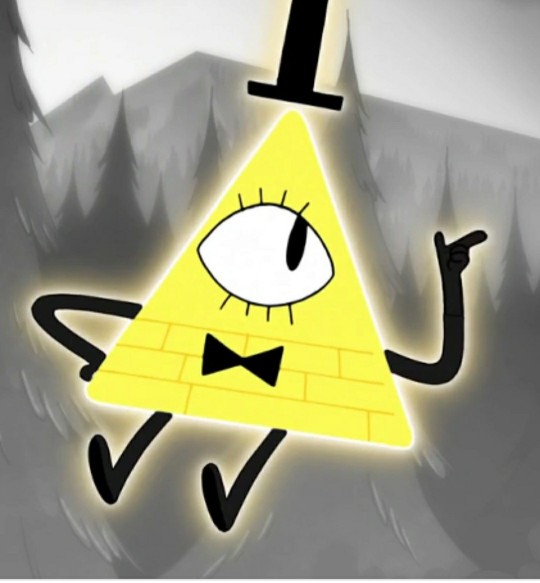
#gravity falls#gravity falls theory#gravity falls bill#axolotl#dipper pines#mabel pines#digital art#drawing#bill cipher
35 notes
·
View notes
Text
Research: Persona Project
Ronin by Frank Miller
Ronin was a comic released by DC comics in 1983, and was created by Frank Miller, who besides having worked on the script, also worked on the illustrations.
Ronin is a internal evolution of the author, something that translates into a leap in quality in his work, transforming and aesthetically renewing his work.
It’s like stepping out of his comfort zone to face challenges to innovate.
Frank Miller stood out for his ability to break models, to shape a canon to a new look. And when he got to DC, he had a lot of new ideas involving the past and future, honor, society, discipline, technology, science and ecology. Miller’s mind amalgamated all this essence that culminated in this miniseries, overcoming any obstacles and marking the industry.
Ronin is the story of a past and a future that come together through science. From feudal Japan to the most decadent and technified New York, a samurai without a master, will return to solve the mistakes of the past, and do whatever it takes.
Miller brings with Ronin his interest that he already showed in other comics, which is the Japanese tradition, molding a crucible in which the past and future are mix organically, when technology is the next step in evolution. New York is engulfed by artificial intelligence that replaces the obsolete, the rotten and the dead, with the new and pure.
But for me, the best part of the comic, apart from the script and the whole idea of setting, is certainly the art.
The art of Ronin, maybe not for everyone’s taste, because it looks quite experimental and surrealist.
However, Miller broke new grounds with new page layouts, playing with the text, the thickness of the lines, close ups, cut plans and pictures, violence, death and pain like never before seen and felt in a comic book.
With a super stylized, bold and almost surrealistic streak. This led to a rejection of the miniseries, but it was necessary because Miller opened up, a new path in terms of narrative and composition of art, and invented new graphic tools with which he went in the direction of the unknown.

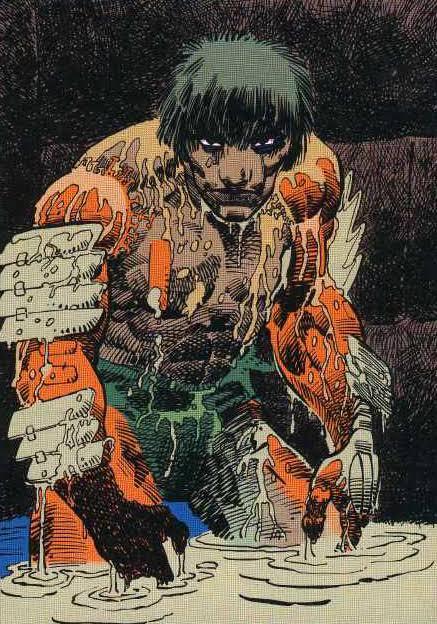
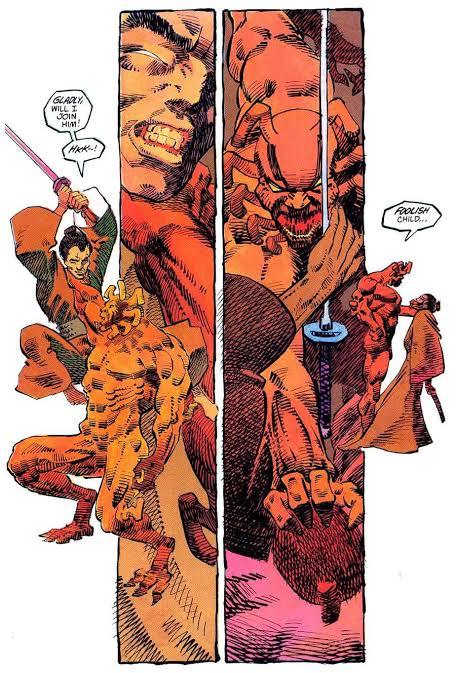
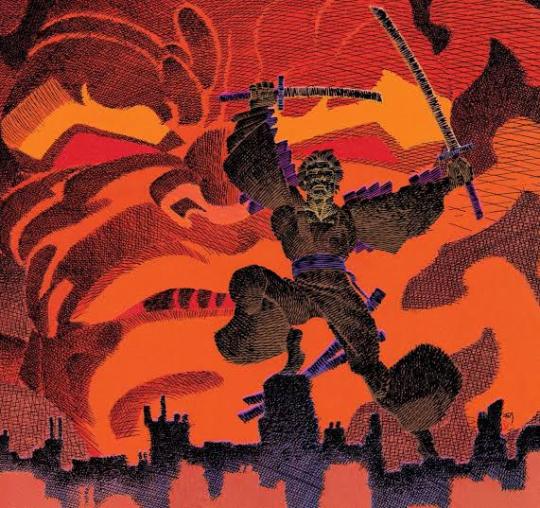
Josan Gonzalez
Josan is a renowned for exploring themes related to science fiction, dystopia, and above all, cyberpunk. He has already stated in an interview that he is strongly inspired by big names like Moebius, Katsuhiro Otomo - creator of Akira - and Geoff Darrow.
Gonzalez likes to create characters full of personality and compose scenarios rich in details. Josan has a very characteristic artistic artistic style: he uses complex line arts, flat colors and limited color palettes.
Being born in Spain, Josan starts reading comics since he was a teenager and this will influence later in his artistic aesthetic.
Initially he adopted a more painterly style which evolved later in the line work. Despite being always passionate about art he never thought it would make a real career from it. He succeeds in publishing his own books and working for big names such as Dark Horse and Boom Studios.
People is considering Josan’s work as being part of Cyberpunk genre, but the artist doesn’t like to classify them. He enjoy creating illustrations without establishing rules, just giving shapes to a futuristic world. Many of Gonzalez characters are linked by cables, which are a perfect metaphor for linkage human-technology. For a lot of artwork the artist get inspiration from religious imagery. Providing his characters with catholic and Hindu symbols. Mostly this happens, because of his catholic background in Spain. Another aspect, is showing people’s addiction with technology, which keep them repressed. Even if the artist explores different social questions his main goal remains the illustration and making interesting and timeless.
some of his most recent works are, for example, is the cover of the new edition of the science fiction book Neoromancer, and the steelbook art of the game Cyberpunk 2077.
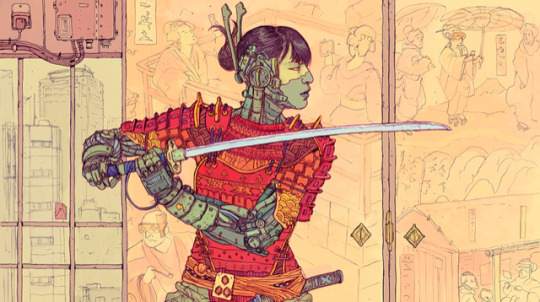


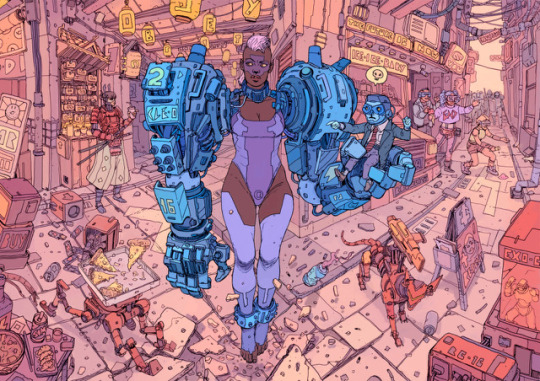
The Story of Miyamoto Musashi
Miyamoto Musashi was Japan’s most famous samurai. He is credited with authoring the most important treatise in Japanese strategy, the “Book of Five Rings”.
Musashi Sensei, as his disciples still call his fighting style, lived from 1584 to 1645.
Musashi dedicated his life to reach perfection through the art of the sword. He fought and won more than 60 life and death duels, and was never defeated. He made contact with other art forms, such as painting, sculpture, calligraphy and poetry, in addition to Zen meditation and Buddhism.
Musashi was born in the province of Harima during one of the most troubled periods in the history of Japan, when the last great battles of the time of the samurai took place.
At the time, it was common in Japan for the same person to change his name at different stages of life. In childhood, Musashi Sensei was called Shinmen Bennosuke. It is believed that he received the first Kenjutsu (famous Japanese martial art) instructions from his father,Shinmen Hirata.
At the age of 13 he won his first duel, and won the second duel when he was 16 years old, as reported in The Book of Five Rings.
In his book Musashi says that his strategy to deconcentrate the opponent and beat him was to arrive late at the place of the duel. On the way, Musashi carved a sword out of a broken paddle and with this sword he dealt a blow to Kojiro winning the duel, which, although fast, is one of the most famous in the history of the samurai. The duel was immortalized in a monument on the island of Funajima representing the figure of the two warriors.
The Funajima duel was a turning point in Musashi’s life because from then on he began to reflect on how he had won so many duels and to dedicate himself to the task of leaving a legacy for future generations. It was from there, too, that Musashi began to dedicate himself to other arts such as painting and poetry.
He worked primarily with a style of ink painting, creating minimalist, monochromatic works portraying nature.
The last years of his life, Musashi spent as a guest with his friend, and then isolated himself in the cave of Reigando where he dedicated himself to meditation and practice of his art writing his Book of Five Rings right there.
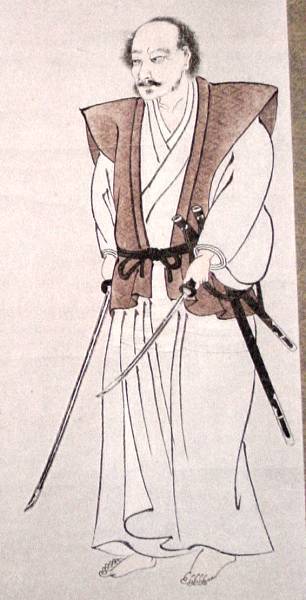

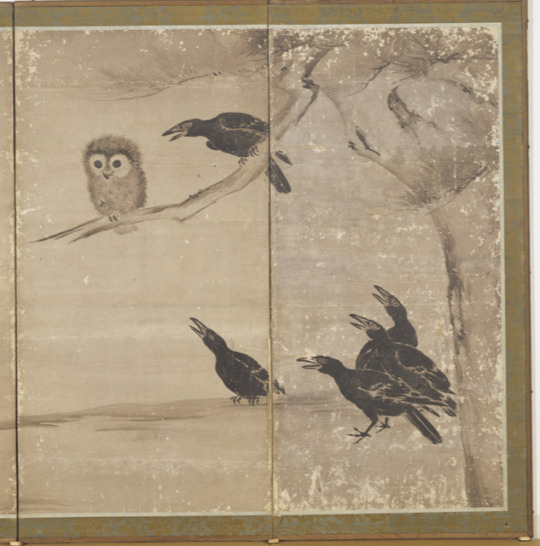

Ned Bear Mask Artist
Sculptor Edward (Ned) Bear has combined study in Native education with an Honours Diploma from Vancouver college.
He has an extensive knowledge of Native art and culture, Bears has also made contributions to change as a curator, guest speaker and juror.
Bear was born in the town Frederecton, New Brunswick, Canada. When he was young boy he was inspired by a Native elder carver, and later on he received a formal training at New Brunswick College of Craft and Design, where he became the first aboriginal student to graduate. Bear received additional training at a Indian Federated College in Nova Scotia.
Bear created sculpted masks and marble or limestone figure forms. His masks are approximately three feet high and are usually carved from butternut. Each mask is adorned with horse hair ( symbolizing the free spirit), bear fur ( symbolizing healing) and metal ( symbolizing something which is of the earth). Each mask tells a story and offer a modern interpretation of traditional spiritual beliefs.
When creating art, Bear considered himself to be simply a vehicle through which energy flows from the eternal Great Spirit to the medium he is using. He doesn’t create any sketches for the masks, he said that he allows the great spirit to guide him through the process.
Ned Bear made significant contributions as an instructor of Native art and culture, a curator, a guest speaker, and a juror.
The indigenous sculptor died on the Christmas evening of 2019, at the age of 65. “ We delve into so many past wrongs of our lives that we forget to revel in the present. Learn to capture what you may never have again, now. Do what makes you content for this time, and begin to realize the true purpose of life”, said Bear.

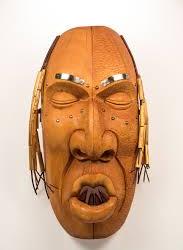


Jim Henson
Jim Henson was an American puppeteer and filmmaker, and most known for creating the Muppets, and directing most of their movies and tv shows.
In the 1960s Henson and his future wife, Jane Nebel, created a puppet show on Washington television station and kept their jobs through the school years, developing the first Muppets (including Kermit) on a one minute television show called Sam and Friends.
The success of Sam and Friends led Henson to create his own company in 1958, initially called Muppets,inc. and many years later, The Jim Henson Company.
Part of the resounding success of Henson’s puppets was due to their innovative view that puppet controllers did not need to be hidden by physical objects while controlling them.
By instructing the camera controllers to focus on the puppets and keep the controllers out of sight, he allowed the puppets to dominate the TV screen and acquire more lively and similar behaviors to real people.
From the productions of Sam and Friends, many characters emerged who became famous over the years and who would become part of the famous cast of the Muppets, including their most famous member, Kermit the Frog.
The Muppet Show, which premiered in 1976 and was produced in England, gained an international audience ( it was shown in about 100 countries) and was soon followed by the film The Muppet Movie (1979).
Henson was able to create an interesting set of characters by developing innovative ideas with a sense of rhythm and humor that won an audience for both children and adults. His works are remembered in part for promoting positive values in childhood such as friendship, magic or love, themes that appeared in most of his works.
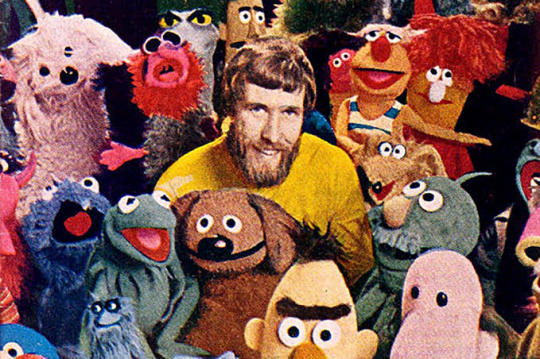

Research: Persona Brazilian Folklore research- Lobisomem
The legend of the werewolf is known practically all over the world. It defines him as being, part man, part wolf, who was cursed with lycanthropy ( the act of becoming a wolf).
The one who is cursed, becomes the werewolf on the nights of the full moon. Some variations of the legend say that lycanthropy was the result of the pact of one man with the devil.
Once transformed into a werewolf, the person frantically sets out in search of victims to kill them. Modern popular culture has spread the idea that the werewolf is vulnerable only to silver bullets or sharp objects made of silver.
Naturally, the legend of the werewolf arrived in Brazil through Portuguese, during the period when they colonized Brazil, in our country, the legend arrived and took on different characteristics in each region.
Some studies have concluded that there is no such legend among indigenous people. The closest to that were legends who believed that men or women could become some animals of the forest.
This legend in Brazilian folklore ended up acquiring elements present in its Portuguese version. Thus, it was common to believe that the werewolf was the man born after the mother had seven daughters, although versions of the legend say that if seven sons were born, the eight son would also be a werewolf.
In the north, of Brazil, the werewolf was the man who was in poor health, and the one who was anemic would eventually would become him. Once transformed, it feeds on the blood of other humans to make up for the poor diet as one of them. The transformation took place from Thursdays to Friday nights.
In the south, in turn, the fact that turned the man into a werewolf was incest. In Brazil, there was no record in the folklore of the belief in transformation of women into werewolves. In the folklore, only men becomes werewolves.
In the interior of São Paulo, it was believed that this being tried to invade the houses to eat children. Many believed that the werewolf went after, especially, unbaptized children.
One of the ways in which the person turned into a werewolf, was if he seriously injured with certain objects. One of these objects was a bullet bathed in candle wax from an altar.


11 notes
·
View notes
Text
Queering KH Part 4: Hearts in Tune
Actually KH Finally lol

Pictured: Riku humming Sora’s name in a soft, adoring, wistful voice the way a swooning straight person sighs the name of their beloved of the opposite gender.
Kingdom Hearts gives off so many subtextual signals of queer coding that it genuinely BAFFLES me how people can really believe it is straight. You may be wondering what makes me so confident in that when there has not been anything in the games to explicitly prove any of the characters are not straight, and I will be happy to tell you. It is because in order to believe Kingdom Hearts is straight, you have to ignore WAY too much subtext. To truly believe that Sora is in love with Kairi and only coded to be interested in Kairi, you have to ignore his questioning of what love is. You have to ignore the combined keyblade he shares with Riku. You have to ignore how much the narrative is driving him to understand that Riku is his most important, cherished person. This all goes doubly for Riku who has a coming out story not unlike Elsa’s metaphorical one, in which his love for Sora is his greatest source of strength. You have to pretend the necklace gifting plot point is entirely straight and cannot possibly mean anything homoromantic. You have to ignore the way Sora cries while clutching Riku’s hand compared to his subdued and non-emotional reunion with Kairi- that’s just too much “accidental subtext” for me to confidently ignore lol. Intentional or not, KH is Gay~
Here’s how we’re gonna do this.
So where the hell do I even begin with coding KH? Well- I can’t possibly queer the whole of KH text in 1 summer, so what I plan to do is this:
Give you the tools to understand KH’s coding so that you can code it yourself~
Queer a few major KH scenes so that everyone can see that the proof is in the pudding.
I’m gonna try to break down various scenes to decode them and queer them so you can see what’s at play in KH. Originally when this meta was a single doc, I was only gonna cover 4 scenes. But since I’m breaking it into parts to update at my leisure, I’m gonna just add scenes and meta as I go~
Now without further ado:
How the Hearts in Tune scene is Gay Coded
This shouldn’t be too hard at all.~

This scene is almost too easy.
The scene opens with Sora bringing Mickey the sound idea he found but as it turns out, one sound idea is not enough. Sora tells us not to worry because he has a friend who is always picking up the slack for him. Likewise, on Riku’s end, he brings his sound idea to Mickey and is surprised to see that Sora’s sound idea is necessary to complete the song.
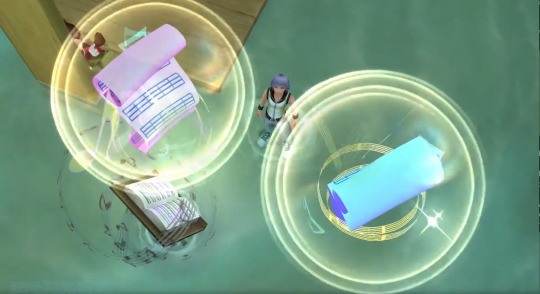
Once the sound ideas meet, this beautiful visual plays out in which the 2 sound ideas swirl around each other and the soundtrack title “Dearly Beloved” plays.
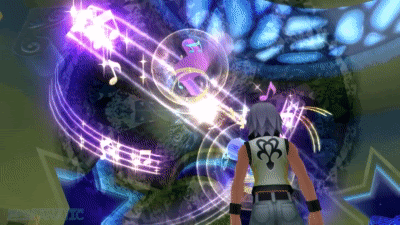
Now, there are several things I want to note about this sequence- heck this visual alone before we move on.
Recall earlier when I discussed Shiki’s point that blue and pink (likewise blue and red) “go together”, romantically.
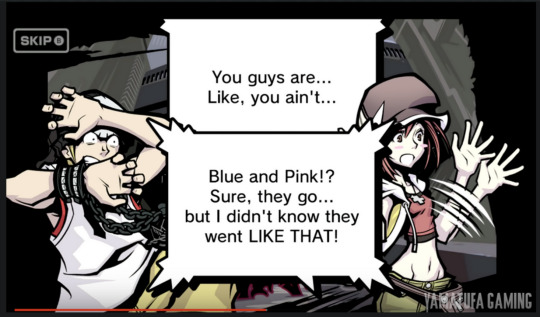
I will let the visual of Sora’s sheet music being pink while Riku’s is blue speak for itself. But I will also add how this ties into the yin and yang themes I’m about to discuss:
Yin and Yang
This concept gets its own section because it’s such an influential concept in so many aspects of various cultures around the globe.
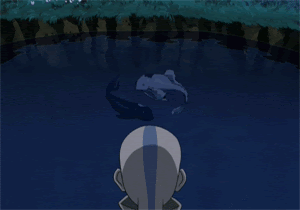
Yin and Yang is an eastern philosophy which illustrates the concept of dualism. In short, it is the concept that 2 opposite halves are complements to a whole. The original term in fact translates to dark-bright.
I am neither a philosophy professor or student so I will keep this as brief as I can and simply encourage you to study up on Yin and Yang at your own leisure. I will however paste this section from wikipedia because I think it is extremely helpful information to have for studying eastern media in general.
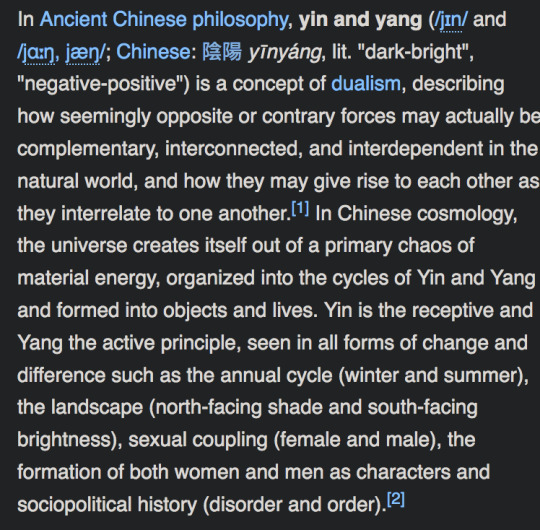
Yin and Yang: husbanded opposing forces. Dark-Light, Moon-Sun, Chaos-Order, Winter-Summer, Negative-Positive.
Female (Yin)-Male (Yang): Yes this is often used in a heteronormative heterosexual context because people are homophobic and believe in gender binaries, unfortunately, but I implore you to consider the concept in more figurative, spiritual, aesthetic themes, especially since Yin and Yang is a much grander philosophy than mere sexuality discourse; it’s about complementary forces creating a whole.
For shipping purposes, think opposites attract. Think concepts that are traditionally associated with femininity meshing with concepts that are traditionally associated with masculinity. Queer media has a wonderful way of subverting heteronormative Yin and Yang tropes by showing that cis-hetero standards can be hypocritically non-compliant with the complementary concept.
Rather than thinking of this, 2 heteros in love based on being just- the same person with opposite genders:
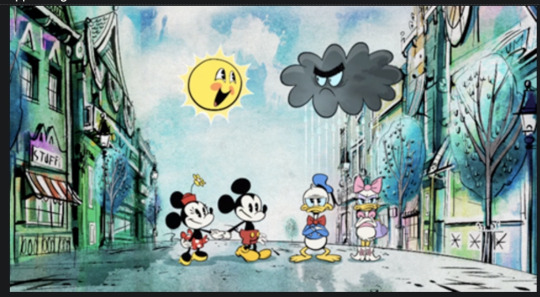
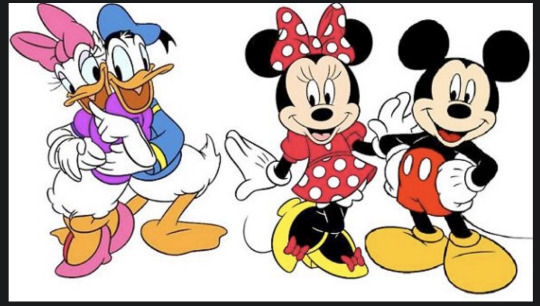
Think of this, same gendered couples with complementary personalities:
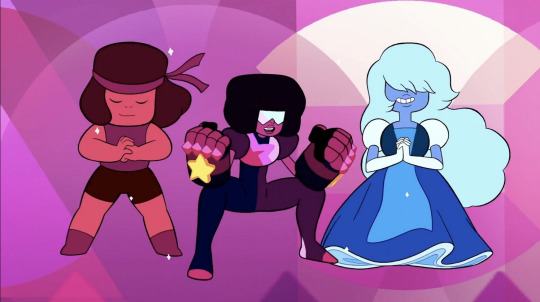
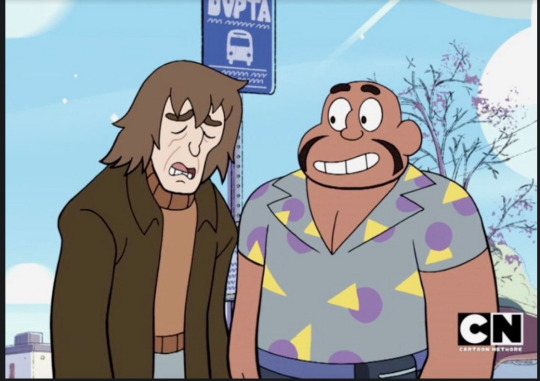
Think about how an aloof scrappy butchy vampire queen attracts an uptight calculating femme princess.

Think about how this goody-goody dumb jock with a martyring hero complex attracts this naughty cunning jock with a self-loathing villaness complex.
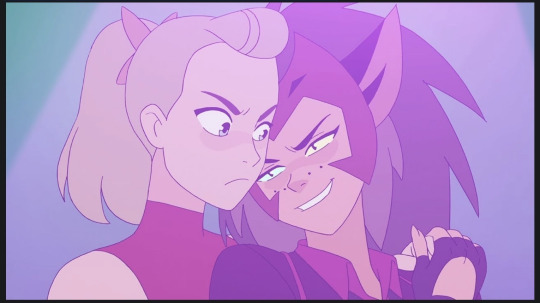
And now think about how badly we need more canonical mlm couples in children’s media lol. Oops my finger slipped. But I’m getting ahead of myself lol.
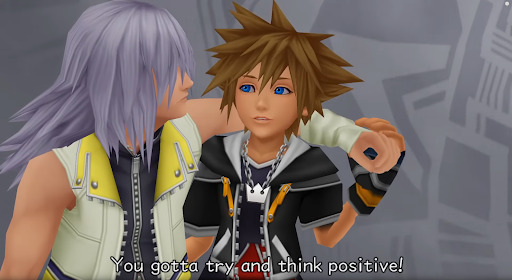
The concepts of interconnected opposite forces are so important and prominent in literature throughout the world, but yin and yang is ESPECIALLY important in Kingdom Hearts because it is a story that explicitly explores Light and Dark forces. It explores how they both oppose one another in catastrophic ways,
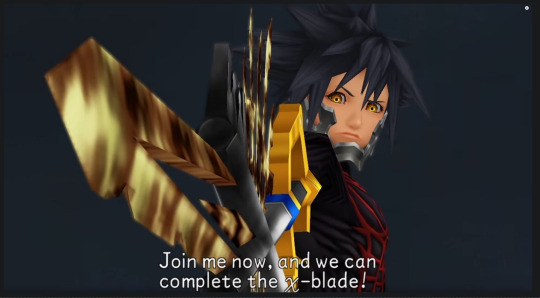
and how they complement each other in harmonious ways.

Getting ahead of myself again… But hey speaking of harmony, back to the matter at hand.
Hearts in Tune.

This scene shows a number of romantic symbols. As I was saying before the yin and yang tangent, pink and blue (nee red and blue) are already symbols of romantic suggestion. And in the case of them representing 2 parts of a whole song, these song pieces act as complementary halves, adding another layer of dualism to the scene. Furthermore, the music sheets swirl around each other in a yin and yang fashion. Harmony has been achieved. This lets us know these forces belong together. These forces representing Sora and Riku. They are husbanded together. These 2 hearts in question are part of each other. In fact, Mickey even says so:
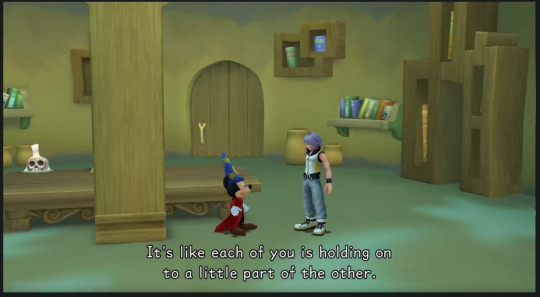
Perhaps most damning, however, is that the song in question is “Dearly Beloved”, arguably the theme song for Kingdom Hearts as far as the score goes. I’m sure it goes without say that “Dearly Beloved” is not only in itself a romantic sounding phrase but it is also the phrase specifically said by officiators of weddings to the congregation before the wedding vows are exchanged. “Dearly Beloved, we are gathered here today…”
I will also mention that Riku’s dream eater symbol visible in the shot is specifically designed based on a bleeding heart flower, a symbol of passionate love. Credit to Steam for pointing this out here, please follow them and read their posts they are magically delicious:
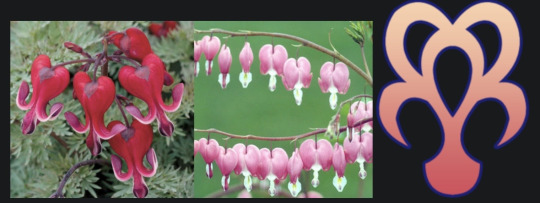
So almost everything about this scene is aesthetically romantically coded, and I didn’t even mention the fact that Dream Drop Distance’s whole color palette is themed with rainbows, which as I said earlier is absolutely still a gay symbol in Japan. Note the rainbow of colors animating from the sheet music.

So in terms of the atmosphere of the scene, its already incredibly homoromantic in every way I can think of. But what about the dialogue?
Well lets talk about the dialogue. Dialogue should always been read with care when you’re trying to queer a text. Often a lot of queer messaging in a text is subtextual. This means the text itself may actually say something gay, but you have to read further into it. This is an old method of queer writing designed to protect the writer from getting in trouble for their gay crimes.
Historical aside on this: If you’ve ever read Oscar Wilde’s “The Picture of Dorian Gray”, you may have note that Lord Henry can never just simply say that he is gay, lest Oscar Wilde be charged for homosexuality in 19th century England. Instead, Lord Henry simply tells us he is married to a woman, but makes it clear throughout the text that this marriage is mostly performative and he is not emotionally invested in it whatsoever, going against the puritanical, heternormative ideals of Victorian prudery. Lord Henry is by contrast MUCH more invested in following the life and times of his very close friend Dorian Gray, with whom he shares a hedonistic philosophy in the name of Fin de siècle. Not to be a downer but for the sake of understanding how real this subject of oppressed gay censorship is, despite keeping the homosexual themes as purely subtext, Oscar Wilde was tried and convicted of homosexuality and this book was used against him in court.
What we are privileged to have today with KH is a cutscene and not just a script. Meaning we have visuals, animation, voice acting, musical cues, etc etc to follow along with to enhance our subtext.
On Sora’s end of the conversation, Mickey points out that the song is incomplete with just his sound idea alone, and Sora tells him not to worry, as Riku is his dependable friend who will fill in where he fails. The text in the official English translation is:
Mickey: That's strange... Is one Sound Idea not enough?
Sora: Don't worry. I've got a friend out there who will help. He's always
picking up the slack for me.
This on its own sounds platonic. But note just how affectionate Sora’s voice acting is when he says it. Not only that, he clutches his heart to let us know how close he is to Riku and how much his connection with Riku matters to him. How much confidence he has in this friend he cares so much about. He then closes his eyes after saying it, smiling up in the air blissfully while he waits for their hearts to make their connection and finish the song.
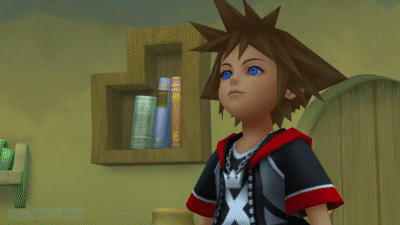
Once it is finished, Mickey remarks that their sounds joined together to make something more powerful. Sora then says looking thoughtful, “Yeah. Two forces are better than one. Right, Riku?”
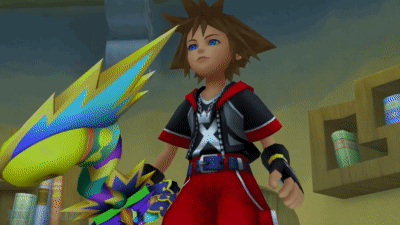
Following this, Sora leaves to fight the boss.
On Riku’s side, Mickey questions what happened, and Riku looks up thoughtfully, and says tenderly, “Sora.”

Mickey comments “Sora? Funny... Just hearing that name kinda makes me wanna smile.” and Riku tells him warmly, “Yeah. That's how he is.”
Mickey then goes on to say some really shippy stuff:
“Whaddaya know... Riku and Sora. The Sound Ideas you two set free joined together. And when they did, they made a great and powerful harmony.”
Riku then nods and tells Mickey brightly that “Sora can find the brightest part of anything, and pull off miracles like there's nothing to it. It's pretty hard not to smile around him.”
And I would like to pause to look at that line. “It’s pretty hard not to smile around him.” Although Mickey says the same thing, that just hearing Sora’s name invokes a smile, we sense a somewhat deeper meaning in Riku saying it. Why is that? Well, for one thing this game is entirely about Riku protecting Sora and exploring how much Sora actually means to him. This game is continuing Riku’s redemption arc from KH2, but it is also doing something perhaps even more important: it is providing him a journey of self discovery. This test resets Sora and Riku to level 1 so to speak, not just in their powers but even their models revert to variations of their KH1 selves. This helps to underscore Riku re-examining himself and his feelings.
And then guess what? Mickey makes some even SHIPPIER commentary. He exclaims “Wow! No wonder the music sounded like so much fun. But I bet he's got you to thank for that. Having such a good friend means he could really enjoy it.”
Riku is taken aback by this comment. “Huh?”
Mickey continues, expressing some extremely yin and yang themed sentiments,
“It's like each of you is holding on to a little part of the other. Your hearts are always in tune, so they're free to sing. Gosh, I hope I can be part of the team someday.”
Mickey did us a wonderful favor and expressed to us explicitly, for those who didn’t understand the romantic coding of the scene already, that Sora and Riku are a good match. Mickey tells Riku that the music sounded like fun in English, that it was a happy, pleasurable time, and tells him that Sora has Riku for a friend which is what must have made it so enjoyable.
So from this dialogue we get assurance that Sora and Riku are two very close friends, whose hearts are connected, and they are 2 powerful forces that merge into an even greater one. Their hearts are in tune.
Now if this were a scene about a boy and a girl, I doubt anyone would question whether it was romantic. Why should we be asked to look at it platonically just because it is 2 boys? The romantic imagery is clear.
And let me ask you this while we’re still on the subject of Dream Drop Distance:
According to Riku’s character files, he had previously thought of Sora as a little brother, and tried to be a cool older brother to him.
He then tells us that this has changed. What did it change to?
The surface level, heteronormative answer would say it changed to them being merely friends.
But isn’t that an odd regression? After all, found family is a thing, and that’s a bit weird for him to question since there is no reason for those feelings to change on that notion. If Sora loved him like a brother, that clearly hasn’t changed. Riku clearly loves Sora as deeply, so that didn’t change. The other problem with this phenomenon Riku is dealing with is that there is no reason for him to feel this strange sense of repression we keep seeing over this change. He is constantly holding back on some feelings for Sora but platonic and brotherly feelings are entirely acceptable. What is it that he is hiding? What sort of feelings for Sora would be hidden?
From the Kh2 Novel:
He really did want to see Sora and talk. But that was impossible with this appearance. The things that mattered the most were what he couldn’t tell Sora. It had always been that way.
What sort of feelings might be systemically oppressed?

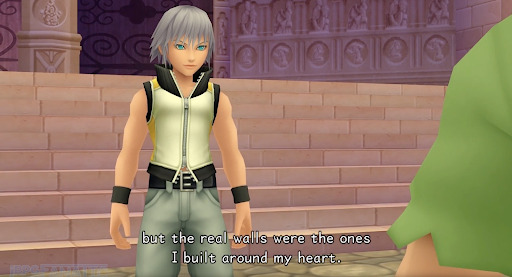
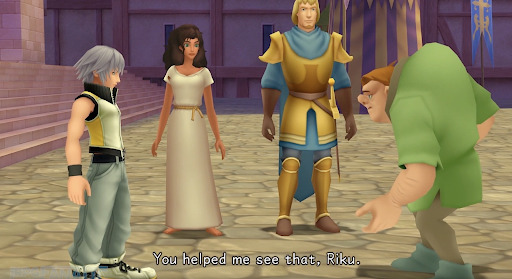
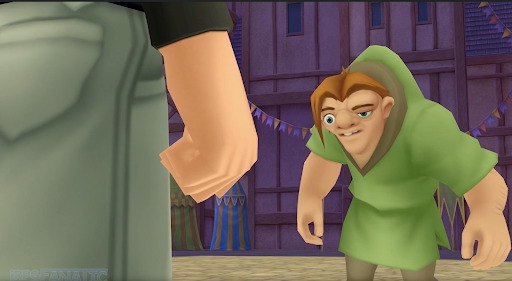
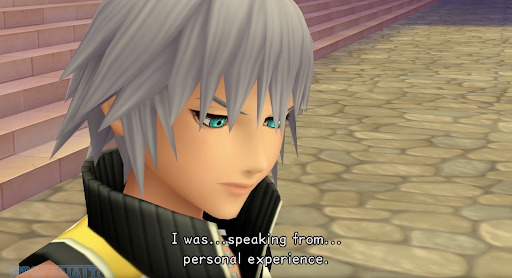
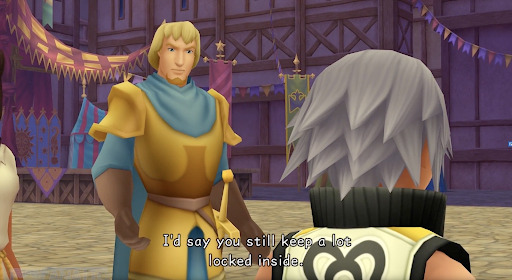
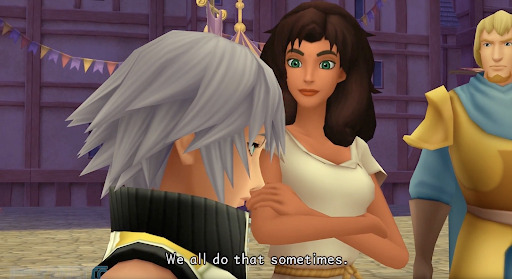
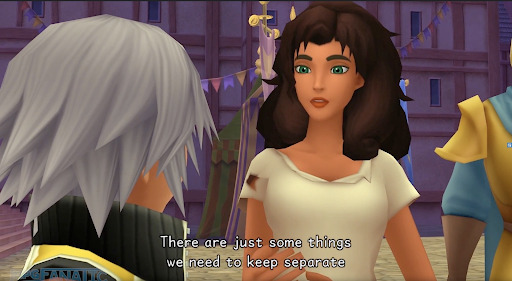
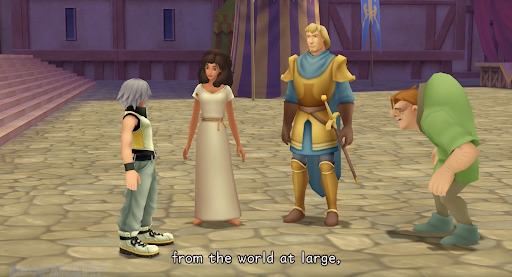
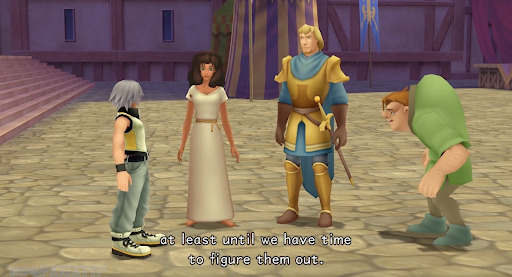
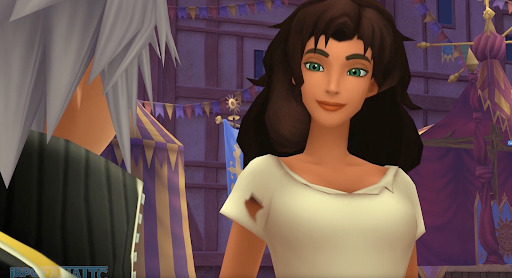

This scene is pretty much EXACTLY what I would do to say as explicitly as possible that Riku is gay without being able to say it outright due to censorship.
73 notes
·
View notes
Text
Nothing Gold Can Stay... (15x04 Atomic Monsters)
Nature’s first green is gold,
Her hardest hue to hold.
Her early leaf’s a flower;
But only so an hour.
Then leaf subsides to leaf.
So Eden sank to grief,
So dawn goes down to day.
Nothing gold can stay.
Robert Frost
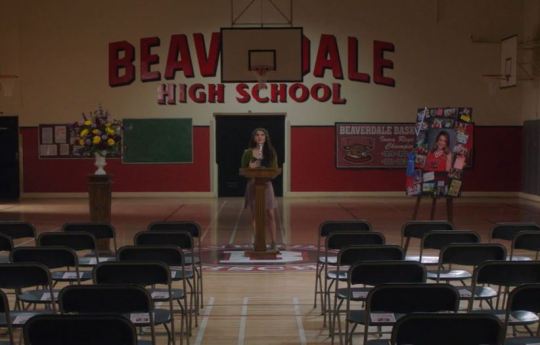
Hey everyone, as ever, I am catching up British-time, so I haven’t jumped into your posts yet, but I’m looking forward to it!
I’m sure there are some great gifs and discussions already out there about Dean and his “man meat” grief-eating.
But I thought I’d start with Veronica and Robert Frost.
Those of you who’ve been following mine or @occamshipper ‘s musings on the use of alchemical themes in Dabb-era SPN will know that gold was highly significant to the medieval alchemists. It was their ultimate goal, to turn “base metal” (lead) into gold, and that was understood as a metaphor (or a mirror on the earthly plane) for the refinement of the soul on its journey to God.
Next week’s episode, 15x05, is titled Proverbs 17.3, and in the Bible, Proverbs 17.3 reads (King James version):
The fining pot is for silver, and the furnace for gold:
But the LORD trieth the hearts
Gold is, officially, a theme. As is the symbolic red of the heart.
As Becky tells Chuck, it’s not the monsters (ooh shade at the Leviathan, whom Chuck thinks were “great”, just like he thought the ending of Game of Thrones was “great”) which SPN fans are really interested in, it’s the emotional interactions between the characters - i.e. their hearts.
Becky, in Perez’ metafictional commentary, is the fan-fiction representative who has come to understand the SPN story better than sucky origin-writer Chuck. She knows it’s about the emotional notes, the heartfelt conversations between the hero characters (including Cas, since she shades his non-mention all too often in Chuck’s MOTW stories) - aka the real “gold” of the story.
Interesting also, in terms of alchemical colour symbolism, are Sam’s God-wound induced “red visions”, which seem to be of an AU in which Sam has succumbed to his old demon-blood addiction (symbolic of his S5 apparent “destiny” of possession by Lucifer):

I was waiting for the Ouroboros (spiral/ circular narrative) reference to 5x04 The End (in its numerical correspondence to 15x04). And here it is, because Sam in the red-vision in 15x04 speaks in a similar voice to Lucifer!Sam in The End. Dean in the 15x04 red vision is a desperate fighter and Sam has said “Yes” to the demonic, just as was the case in 5x04 The End.:

In alchemy, there are four traditional colour-stages along the alchemical transformational road from lead to gold - nigredo (blackening) albedo (whitening) citrinitas (yellowing) and rubedo (reddening). Reddening is the final stage before gold. So Sam’s red-visions, and the gold which becomes a theme in 15x04 by means of the quotation from Robert Frost’s beautiful poem, are linked pieces of alchemical symbolism.
Their meaning, I think, is that just as Amara’s link to Dean through the Mark of Cain changed Amara for the better (she learned about love through experiencing Dean’s “heart” through the Mark in S11, thus shaking off The DarknessTM to become clothed in yellow, the colour of the sun, at the start of S15), so Sam’s link to Chuck through the God-gun (of equalising/ revenge) will (hopefully, eventually) change Chuck for the better. A balance of powers - the feminine God-principle and the masculine God-principle, both learning compassion and becoming their higher selves (achieving the spiritual synthesis of “gold”) through their links to the (red) hearts of the Winchesters.
That means suffering for the Winchesters along the way, of course, as they too, undergo the alchemical process of self-transformation by (eventually) fully facing their Shadows (their unconscious); Sam’s fear of being permanently “contaminated” by the demon-blood fed to him as a baby, and Dean’s fear of abandonment (stemming from the loss of his mother) which leads him to be over-controlling and to act out and push people (ahem, Cas) away.
But back to Veronica. Veronica who quotes Robert Frost’s lovely poem in her tribute speech to her “best friend” Suzy (possibly, her lover - that subtextual reading is certainly available).
Veronica is a fascinating character, because she is “read wrong”, by Dean in particular, who thinks she’s the vampire, the one killing her cheerleader rivals in order to get the top spot. And he’s wrong because, as Sam points out, she has braces, a no-no for vamp-teeth. Dean is really sarcastic about the memorial speech Veronica is practising for Suzy, of whom she says, “I’m lost without Suzy, it’s like a piece of my heart is gone.”
Here is Dean, being a sarcastic little shit about Veronica’s emotive school-girl speech:

Of course, Veronica’s eulogy for her dead beloved, who was “gold” and thus (in her Frost’s poem analogy) was too beautiful to last in this world, is too painful for Dean to hear. It verbalises what he cannot (he can’t even bear to speak Castiel’s name, all episode):
“My best friend Suzy who I miss like she was a part of me, and in many ways she’s still a part of me.”
In subtext, Dean also reads Veronica “wrong” because he thinks she was Suzy’s rival, when in fact, she was her lover (part of a Veronica-Suzy-Billy love-triangle, the F/F element emphasised by their attendance at a school called “Beaverdale” where “beaver” is of course slang for vagina).
Look at all those red hearts (symbols of romantic love) on Suzy’s memorial pin-board, Indeed, look at all that red in general. A “match” for Sam’s “red-visions”. If Sam’s rubedo (alchemical reddening) trial is his God-wound, Dean’s is his separation from Cas:

Veronica, it seems (unbeknownst to the Winchesters) is a neophyte hunter (as well as, in subtext, Suzy’s lover) a sleuth, on the trail of whoever killed Suzy. And it looks like she knows it was a vampire. When Sam and Dean are questioning her (and she’s clearly suspicious of them) we see her with a syringe of what looks like blood behind her back, ready to jab them:

We know, from 1x20 Dead Man’s Blood, that in the SPN universe, a dead person’s blood can temporarily take down a vamp. So it seems that whilst Dean suspects Veronica of being the vampire, she suspects the Winchesters (a recurrence of SPN’s perennial - “Who is really the monster?”/ it’s not black-and-white theme. The reference to Dead Man’s Blood is also interesting, as this was an early episode in which Dean defied his father (stepped out of being John’s “good little solider”, who did see monsters in black-and-white) yet now, we have, Ouroboros-style Dean regressing to old John-learned behaviours (conceal, don’t feel) after the second death of Mary.
I love this little Veronica detail. It’s an un-explored thread in the story, a piece of fan-fiction catnip begging for further elaboration. More Perez meta-narrative, in fact, in which he suggests that, despite the sinister Chuck and his insistence on a final SPN ending with a gravestone reading “Winchesters”, the story itself is WaywardTM; it is capable of fluidity, of control being wrested from the origin-creator (God). After all, Chuck created free will, and despite his desire for total control, he cannot undo this wild-card element in the narrative, which Veronica’s little secret hunter-identity (in subtext, also, her secret queer identity) just like Becky’s fan-fic, is a mirror for.
Veronica’s citation of Frost’s melancholic poem becomes a metaphor for (Dean’s) lost love. Just as Sam’s mention in the final Impala scene, of how he still thinks about Jess often, becomes a verbalisation for Dean’s own constant (unspoken) thoughts about his own lost love; Cas.
Veronica and Billy (who were possibly both Suzy’s lovers; although in text it’s Billy, in subtext Veronica, true to SPN’s ongoing bisexual subtext in relation to Dean) exchange a memorial bracelet to Suzy in front of Suzy’s picture, as Veronica tells Billy a piece of her heart is gone:
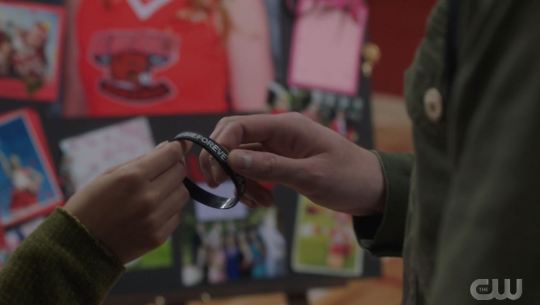
Both are mirror images for Dean - Veronica-the-vampire-hunter who mourns excessively, and Billy-the-vampire, who has killed the person he loved (just as Dean has driven Cas away):

Dean is forced by Chuck’s authorial hand to kill Billy, who is both a representation of his own lost son, Jack (Chuck’s cruel re-staging of the scene in which Dean almost kills Jack in 14x20 Moriah) and of Dean himself (symbolising Dean’s present “self-murder” aka his self-punishment and repression re Cas):

Nothing gold can stay....
Frost’s poem is also used by Perez as a metanarrative commentary on the sadness we all feel as SPN draws to a close. Everything beautiful has its time to fade and die, Frost says; even SPN, says Perez.
Frost’s poem also makes reference to Eden, to the Fall, and how that was, in God’s plan, an inevitability; the descent from the Godly to the earthly.
It’s noticeable how, just as The Fall was presented as Eve’s fault in the Bible, Chuck is, yet again, trying to eliminate the feminine principle from the narrative, just as he has always done throughout SPN (which began with the deaths of Mary Winchester and Jess). Chuck kills Suzy, as the driver of the episode, and he “poufs” Becky (the fan-fic writer) out of existence (possibly into an AU) so he can finish the story the way he wants, just as he has re-murdered Mary Winchester (or possibly also poufed her into an AU) to continue the Winchesters’ suffering.
But Chuck’s determination to arrive at a tragic ending, an ending in which the feminine principle is still subjugated, Perez suggests, can be subverted, because the seeds of subversion are already there in the story; Veronica’s secret and subversive sleuthing (slash her subtextual queerness), Becky’s emotionally open, subversive, fan-fic, and the continued yearning of the Winchesters for true free will (not yet knowing Chuck is still actively f-ing with them) despite the burden of their grief,
If gold is the result of the final alchemical synthesis, of “masculine” and “feminine” principles, of the conscious and the unconscious mind, here represented by Chuck-the-author and Becky-the-fan-fic writer (who were once a couple, but are now broken up, just as Chuck and Amara, Dean and Cas, are currently broken up).... Then, the alchemical symbolism suggests, the darkness of the break-up stage (The Abyss, which we are currently in) can be overcome by the red (rubedo) power of the heart - Sam’s God-wound trial, his heart-connection to Chuck, and Dean’s own heart-wound trial, the loss of his (heart) connection to Cas.
Yes, we are still working on the power of love.
Love ultimately confounded Chuck’s apocalypse in S5, when TFW went “off script” and, Ouroboros-style, it can do so again in S15.
Chuck can be overthrown (transformed), Perez tells us, by his own story; and thus the story can find its own (heart-filled) free will ending.
Perhaps, after all, something gold can stay.*
*My usual disclaimer applies - none of this suggests or implies an inevitable Dean/ Cas romantic (unequivocal) textualisation.
Although, I would like to think that Perez, by including the by now all too formulaic Dean-is-bisexual subtext via bisexual (subtextual) mirroring in 15x04, is commenting, meta-fictionally, on Chuck’s (aka TPTB’s) (wearisome) eternal tendency to do this, thereby suggesting that the over-turning of Chuck’s narrative control should, by rights, also include the overturning of this formula into... something new.
#Supernatural#15x04#Atomic Monsters#SPN meta#Meta#5x04#The End#Ouroboros narrative#Alchemy in S15#Alchemy in SPN#Dean is bisexual#Still subtext#But subtext IS part of narrative#As above so below#Mirroring as narrative device#Chuck Shurley#SPN metanarrative#Long post for TS
180 notes
·
View notes
Note
could i get a tarot readin n shufflemancy about my Damara Captor (mituna-wayz) timeline? thank u!
I’m on it! I’ll do the shufflemancy first, and try to base the tarot reading off of it!
———————————–
Shine a Light / Heathers: The Musical Original Off-Broadway Cast
———————————–
[MS. FLEMING]
Deep inside of everyone
There's a hot ball of shame
Guilt, regret, anxiety
Fears we dare not name
But, if we show the ugly parts
That we hide away
They turn out to be beautiful
By the light of day!
Why not-
[COMPANY]
Shine, shine, shine a light!
[MS. FLEMING]
On your deepest fears!
[COMPANY]
Let in sunlight now
[MS. FLEMING]
And your pain will disappear!
[COMPANY]
Shine, shine, shine
[MS. FLEMING]
And your scars and your flaws
[COMPANY]
Will look lovely because you shine!
[MS. FLEMING]
You shine a light
———————————–
There are two sides to this song. A. that you tried to act as a therapist to your friend group, or B. that you struggled with deep internal issues, and that someone tried to help you out of it. If it was A., you did a poor job of it, and tried to preach that being happy and opening up will make everything just magically go away (which is blatantly false). If it was B., then it was most likely that you tried to open up, but it didn’t help as much as you thought it could. The person who was helping you could have also been misinformed on the issues you were facing, which hindered the process.
———————————–
I’ll do the tarot reading using my go-to spread, sorry there isn’t a link to it anymore
———————————–
You (top card): Something about the kintype, more broad, sometimes obvious but it may still be overlooked
I got the reversed Six of Wands, which symbolizes fear, news of failure, delay, treachery, and disloyalty. You could have had trust and/or abandonment issues, and they were proven to be true when a friend (or a group of friends) stabbed you in the back (metaphorically), and you were left with no one to go to.
———————————–
Home (left card): Something about your canon, can be general or specific
I got the reversed Eight of Cups, which symbolizes interest in success, joy, feasting, celebration, and material over spiritual. Either before or after what happened in the previous card (and possibly the shufflemancy too) happened, you were generally a happy person, and often partied with your friends.
———————————–
Heart (right card): Something fundamental about the kintype, something that makes you you
I got the reversed Seven of Swords, which symbolizes new beginnings, impulsive action, generous nature, and relaxation after stress. After your friends left you, you were able to start anew, and form new relationships. You were especially generous to your new friends, compared to your old ones, and even then you were still generous.
———————————–
I know this one was a bit more negative, but I still hope it helps you
1 note
·
View note
Note
What do you think of the porgs and their meaning for IX? I saw the cover of star wars insider 2019 special edition with Rey on it and a Porg at the corner. At first I thought this whole Porg stuff is all just for fun but then I read Leia - princess of Alderran and there is a passage (19, I believe) where Holdo speaks about breeding and to resolve a problem between parents and child . . . What do you think could this all mean?
Dear anon, this answer was a long time coming. Thank you so much for bringing up Porgs again, because, you got it all right! Porgs matter! They matter so much, not just like your Ewok novelty. People thinking they were just an excuse to sell cheap toys are utterly confused and missed the whole point.
The reason why Porgs were created in TLJ, after all, probably stems from a very practical reason. Skellig Michael Island, in Ireland, where the scenes for Ahch-To were shot both for the end of TFA and for TLJ, is a famous puffin sanctuary. It is also a place with a heavy spiritual past, which also, besides its gorgeous scenery, might have been why they chose it. But they still had to make do with the massive population of puffins. At the end of TFA we are vaguely aware of birds coming and going. But the little time spent on Ahch-To on TFA meant that we didn’t get enough scenes there to really pay attention on what these birds were. No CGI. No particular intent there. For TLJ they knew they were going to spend more time on the island. Get more shots. And so more probable that the birds would get more obtrusive within the action. So, what to do? This is what Jake Lunt Davies, the creature concept designer of the Porgs had to say:
Rian [Johnson – the director] had gone to shoot this sequence on Skellig Michael, which is the real island location that stands in for Ahch-To, and that island is covered in puffins. It’s a wildlife preserve and everywhere you look there are hundreds of birds dotted around the landscape.
From what I gathered, Rian, in a positive spin on this, was looking at how can he work with this. You can’t remove them. You physically can’t get rid of them. And digitally removing them is an issue and a lot of work, so let’s just roll with it, play with it. And so I think he thought, “Well, that’s great, let’s have our own indigenous species.”… The puffins were sort of a big influence on everything, really.
RJ put a spin on theme… He knew he was going to make them part of the whole thing. I personally don’t think this was a machiavellian scam to jam down obniouxly cute creatures down out throats. I don’t. I think that right off the bat RJ decided that he was going to use the porgs as a specific vehicle for a very important message… breeding… the power of love and love creating new life… mating and babies…. And lo, how he hammered that point throughout the movie: in Luke’s first lesson to Rey about the nature of the Force, with mama porg protecting her eggs. And with the porgs nesting on the MF.

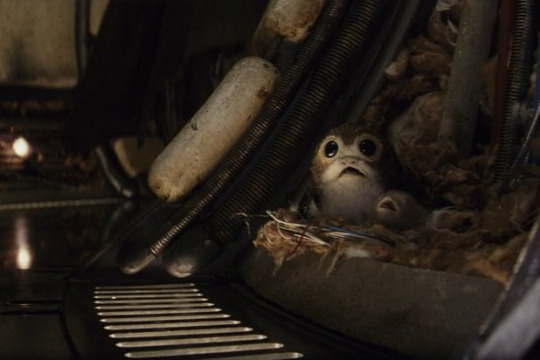
Now, I did a specific giant meta about birds and mating throughout SW: Bird is the Word- Avian Metaphor and Mating in Star Wars. This is an excerpt from my meta that might sum up what the “bird experience” means to me:
TLJ was meant as Sex Ed class for Rey and Kylo. I should not have to develop the many many sexual symbols on Ahch-To, the caves, wetness, and the glorious nakedness of Kylo, or the smut hut. Remember, I am talking about birds. And what do the birds mean? Birds represent life, mating, nesting. And of course they are much more appealing symbols of reproduction than bunnies, let’s say, because birds are ascensional symbols. They do represent the pressures of biology and reproduction, but their graceful flight gives spiritual value to the deed. Birds are the link between the earth and the sky, the body and the soul, mortals and immortals, humans and gods. Think about Leda and the Swan, or Aphrodite’s dove, and all these cutesy birdies that usually flutter around our favorite Disney princesses, especially when they sing about love or falling in love. Think about Bambi and the spectacle of love-crazed birds. Twitterpatted alright!
Go check out the meta really because it is astounding how much the bird motif is “pregnant” (lol) in the movies and in the ST in particular. The EU brought even more substance with that cute parallel between this Forces of Destiny episode on porgs (Porgs problems) and the Lion King… Further read on this one in this post: More on Porgs …
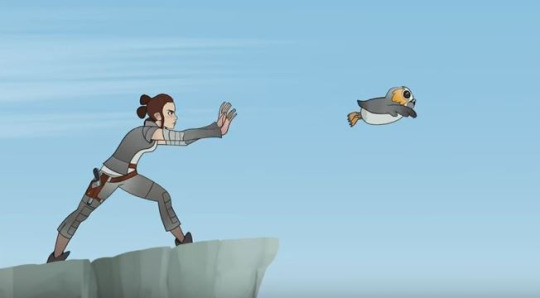

That:being said, once the tale was told, of course Disney and LF jumped on the bandwagon of selling porgs as the cute novelty toy! Of course they would. It is only fair. But I don’t think for one minute that they were imagined and designed that way. PORGS ARE MEANINGFUL!!!!!
Now, dear anon, you bring up something from Leia Princess of Alderaan which is indeed super important. It does come from chapter 19, p.243 for the hardcover edition. Leia is then falling for her first love, Kier. And as the princess struggles between her feelings and her moral duty, and wonders whether she is entitled to happiness in such dire times, this is what Amilyn Holdo tells her:
If the young of the species don’t have motivations to leave the care of their parents, they’ll never lead an independent existence, which means they’ll never reproduce. The species would soon die out. Ergo, the last stage of life before adulthood always involve conflict between parents and offspring.
There are many key points for the ST there. “Motivations” is a word that should ring a bell… What are Kylo’s motivations, for one? But also remember that scene in TFA when Rey is trying to fix the “motivator” on the MF, a scene that comes right afterward Kylo’s asking about “What girl?”
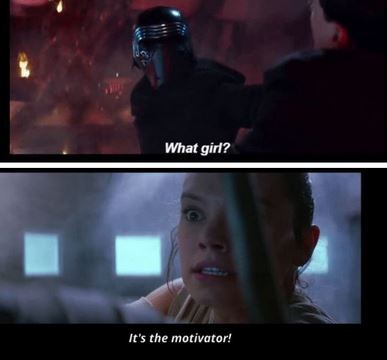
And remember how the scene is cut in a way that the characters almost seem to reach out to each other, like a first try at teh Force bond device we get so beautifully done in TLJ.
You also have the paramount importance of leaving the parents to gain independence. That is Rey at the beginning of TFA. She is unable to let go of her parents. She is thus maintained in perpetual childhood and childishness, which are emphasized at the beginning of the movie by the concept for her hair (same style as the one she had as a child), the toys in her At-AT, theme music, and facial expressions when on her own (eating or playing with the helmet).
And then tyou have conflict with the parents. And that’s obviously Kylo.
So, yep, this is all about breeding and need to reproduce. BTW, on Kylo’s Spotify playlist, THIS: Breed by Nirvana. Coincidence? Of course not.
Further in Claudia Gray’s book, on p.245, to be more specific, Holdo adds:
Happiness is our moral imperative. (…)
Great evil can only be fought by the strong. People need spiritual fuel as much as they need food, water, and air. Happiness, love, joy, hope -these are the emotions that give us the strength to do what we need to do.
Interesting cluster of words. Holdo is all about vital force, the reproductive and restorative spark. Just like her famous quote in TLJ: “We are the spark, that’ll light the fire, that will restore the Republic.“ Restorative, reproductive, constructive. Just like Rose’s quote about saving what you love. Which is, very significantly, twisted and misinterpreted by Poe (and rage-fueled fanboys): “We are the spark, that will light the fire that’ll burn the First Order down”, which is destructive.
Also, it is in this book that we find a quote that was -revealingly- removed from TLJ : “the most dangerous substance known to exist (IS…) a pair of pretty dark eyes”. This Jane Austen quote was uttered in TLJ by none other than Luke Skywalker yours truly to Rey after her hand scene with Kylo:
“You opened yourself to Dark Side for a pair of pretty eyes!“
So, in the end what? You can guess where this is all going. Your intuition was correct. Of course it means that there will be a resolution of conflict between Kylo and his parents (even symbolically, because, yes, I know that Han is dead!!!). And of course there will be babies or the suggestion of babies (pregnant belly?) or some lovemaking (or suggestion of love making) at some point or as the endgame. There is no other way to read or interpret all the ST material and the EU canon material. After all this book you very kindly brought to attention yet again is aptly headed “JOURNEY TO STAR WARS THE LAST JEDI”. It is a companion book. It is meant that way. It has to reflect what the main themes are from the movie….

Hope that covered your question. Thanks again for reaching out!
#reylo fandom#reylo#star wars fandom#leia princess of alderaan#leia and amilyn#amilyn holdo#porgs#porgs in the last jedi#star wars symbolism#babies in star wars#star wars episode ix#love in star wars
322 notes
·
View notes
Text
BNHA Rewatch: Episode 27 “Bizarre! Gran Torino Appears!”
mysterylover123
The Internship arc starts off with a bang! Let’s see that Full Cowl, Deku!
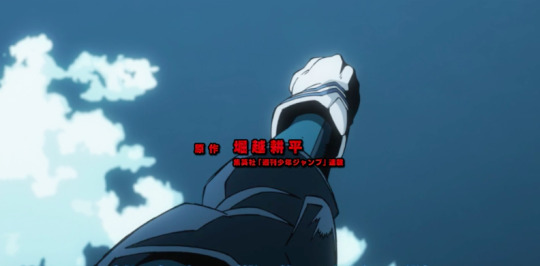
SORA NI UTAEBA! While the song in this intro is kinda meh to me, the visuals are amazing. I love the symbolism for all the events of the ep - tho not gonna lie, this core’s ED is better than the OP. Anyway tho, go punch that wall Deku!
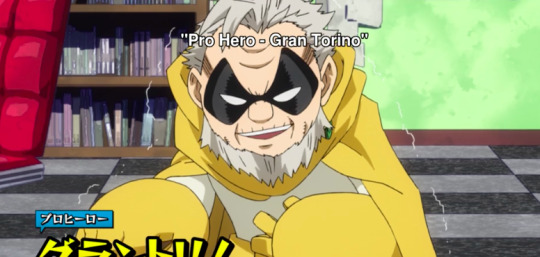
We start with Gran Torino pretending to be crazy. I’ll admit, I’m kinda eh on this bit, though I love Gran. It’s probably because I found it annoying when Yoda did it, so I find it annoying here as well. (It’s really just my inner fangirl talking. Nobody makes Deku unhappy except Kacchan. Who can get away with it.)

But actually, this sets up an interesting difference between Deku and Luke, though admittedly situation isn’t the same because Deku knows Gran is Gran. But Deku’s response to this is to call All Might to tell him Gran’s gone senile. He’s so empathetic Deku why aren’t you real? (no shade at Luke there,e I love him too. Just not as much).

“I don’t have time to mess around.” Deku did not come to play.

New costume! It’s incredible how much better it is than the old one. Like, not even funny how much better. Day-um, Deku.
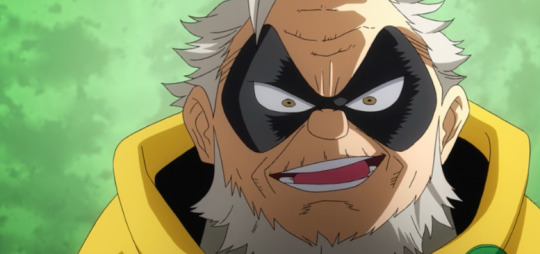
Pfh Gran knows exactly how to piss off Deku: Insult All Might. You clever little scoundrel.
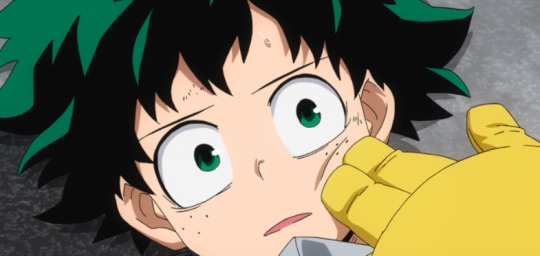
So onto Deku’s character flaws: 1. He’s overly analytical. Deku doesn’t know how to act quickly, partially due to circumstance, but partially that’s just how he is. Hesitant. Over-cautious, over-thinks things. He needs to learn how to take action - and in this arc, he does indeed do so without hesitation, and saves Iida’s life by so-doing. Box 1 checked off.
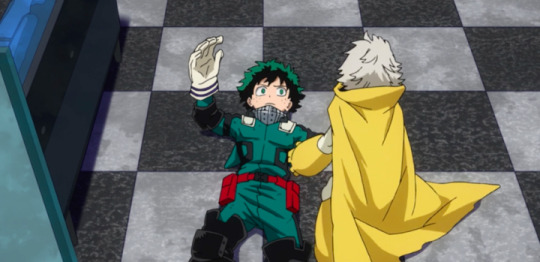
2. Deku admires All Might too much. Like every MC in BNHA, his Imitation is the Sincerest Form of Tragedy (insert me telling you to read that essay again). It’s a problem because he doesn’t believe in himself. So he needs to learn not to imitate All Might and be his own hero. That one doesn’t really sink in until the PLE arc. But check.
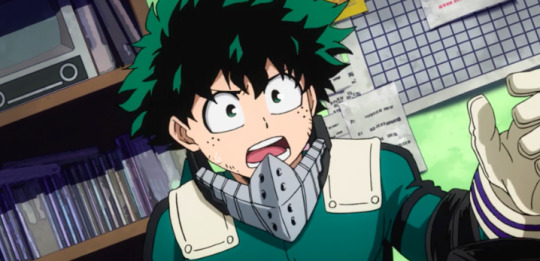
3. Deku is insecure. He has a massive inferiority complex (which fits nicely into his foil’s inf-sup complex, wouldn’t-cha-know) and doesn’t believe in himself. So he needs to learn to be more confident. (Is it wrong that I want this to end with him breaking through Instrumentality to a chorus of his friends saying ‘Congratulations’?)

Gran is my favorite Teacher, as a teacher, in BNHA. I’m a teaching-major, and I kinda aspire to his techniques. What I love the most is helping students figure it out themselves. Just telling someone the answer doesn’t help them. It’s so satisfying seeing a student make that breakthrough thanks to your guidance.
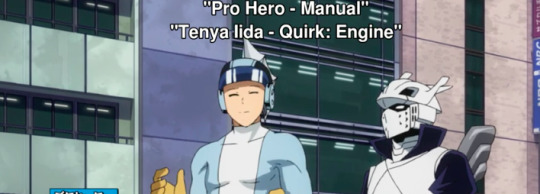
Now we’re cutting away to Iida’s internship to remind you Iida Wants Revenge. This is a little exposition-y, let’s cut somewhere else.
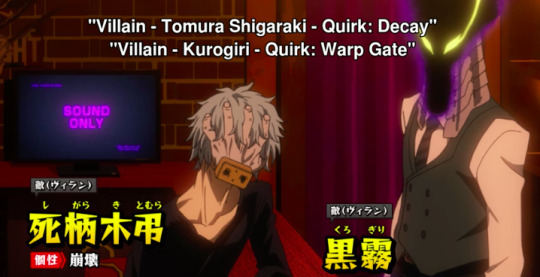
OK good, the villains! Right off the bat, we’ve got some great Parallels with the Heroes, as Tomura decides to basically Intern with a Pro-Villain. He even calls Stain a pro. Tho Tomura really needs to work on his recruitment strategy. “Stain join us. Cause.” “Bakugou. Join us. Cause”.

I want Deku and Tomura to build a grand Hero-Villain rivalry. Tomura basically hates him for no real reason right now, and I want there to be a good reason. Other than “He’s All Might’s successor”. I want them to be the Joker and Batman of BNHA with a real complex hero-villain rivalry, where one reflects the other. They’re getting there but I want more.

“Bloodlust without conviction is meaningless.” Ooh I love me some Stain. He really elevated this series’ philosophical side with his ramblings on heroism and villainy.
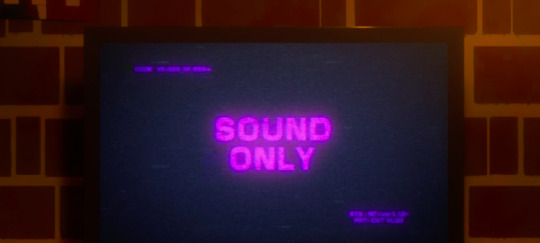
OK am I creeped out by the fact that All for One just said the same thing I did about learning? A little.

Deku is so brilliant and such a fast learner tho. It doesn’t take him long to put it all together. And Gran actually really admires him for that - I enjoy their mentor dynamic a lot, since Gran has some real respect for Midoriya in a different way from All Might.
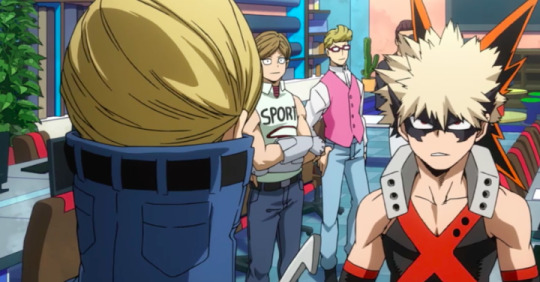
Bakugou with Best Jeanist! OMG the comedy gold of this. Though I just want to take a sec to gripe about a change from the manga to the anime: Manga! Bakugou does not charge at Best Jeanist and yell at him. He’s not dumb enough to try that on the #4 Pro Hero and his teacher. He sits still and listens to Jeanist’s lecture. The only Bakugo line here that’s from the manga is “Didn’t you make an offer for me?” This completely changes the way we perceive Bakugo in this scene, and in general. Bad change.
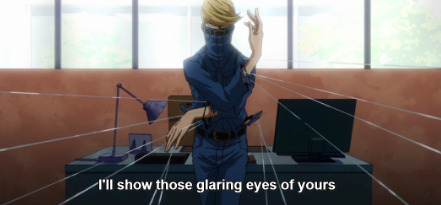
But in Good Storytelling-ville, I like the continuing parallels between the Wonder duo this creates: Izuku interns in a rundown neighborhood with an unlisted hero, Bakugo in Tokyo with a top pro. Izuku needs to learn to control his power and believe in himself. Katsuki needs to learn to be kinder and more humble. Izuku learns his lesson her, Katsuki doesn’t. Parallels!
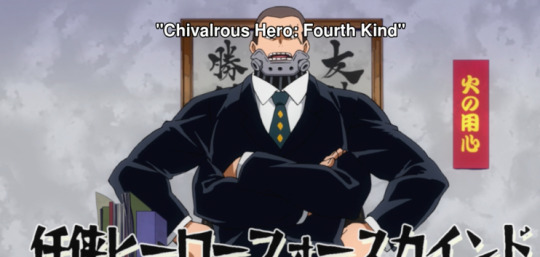
Kirishima and Tetsutetsu again! 4th kind is ok. He’s probably the least memorable of the internship pros, since his gimmick is simple and his design kinda dull.

Uraraka and Gunhead! I love how well they get along. He’s kawaii and she’s a hardcore badass. Don’t you forget it!

Now for more of Momo’s arc. The Uwabami internship is usually dismissed by fans as Just Fanservice, but think about it in context, and it becomes really interesting. One, the Hero Killer arc is about Stain protesting the commercialization of heroism, so we do need to have a Pro-Hero demonstrate the problematic nature of that commercialism. Uwabami does just that. Two, we need to have Momo’s internship be unfulfilling to her, to complete her downward trajectory (before the Final Exam arc can bring her back up), so it’s useful for further embarrassing and developing her character. 3, it sets up Momo and Kendo’s future rivalry.
I’ll take more about it in future eps where it appears.

Izuku practicing and constantly hitting his face on the wall is one of those things that makes me wonder if either a) he has a secret endurance quirk or b) OFA just naturally ups your durability. How does he still have a face after that.
Here’s a hot take: Izuku with his face smashed up from spending a night with no sleep training in garbage all night is still prettier than any other guy in this series.

One of the reviewers I follow made the comparison between All Might vs Deku’s using of OFA and Korra vs Aang’s role as the Avatar. You know, All Might and Korra, both master the power pretty quickly so they get to be strong fast but lose out on the spiritual connection a bit, while Deku and Aang take their time learning ofa/the four elements, but get as a tradeoff more of the spirit-y side...(ATLA & BNHA. My 2 favorite shows, alongside FMA. I swear these are like, three sides of the same show).

While I’m watching in the Sub this time around, i wanted to note a dub-ism in this scene: it’s localized to ‘hot pastries’ instead of taiyaki. There’s a lot of bits like that, where they take Japanese food and translate it for us dumb Americans. But well, maybe that made sense in the 90s, when there maybe wasn’t as much cultural crossover, but...even I knew what mochi were before watching BNHA (Uraraka’s fave, and the dub always localizes it to ‘sweets’) and everyone has google if they’re confused so why not just say ‘Taiyaki?’ Ah well, it’s a stupid nitpick but still.

Gran’s metaphor here is so great. As a teacher I aspire to learn from this man. Teach me your teaching ways.

“THIS TAIYAKI IS ME!!!!!” Another dub-ism has him say “I’m not really a dessert” I saw a reactor once comment on this ‘Yeah, but you are a snacc, Deku.’ I wholeheartedly agree.

FULL COWLLLLLLL!!!!!!! FYEAH!!!!!
OK so there are a lot of reasons I love Full Cowl. it’s one of the series’ finest moments, emblematic of what makes it cool. And what makes Deku cool. He’s smart, and has to work his way around problems, and this solution was just...it was there, for us and Izuku the whole time, to finally sit up and take notice of. It’s about applying power in a different way. About taking what you can do and doing the best you can with what you’ve got. A big central theme for the series.
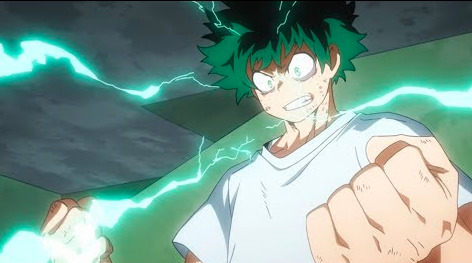
Also dayum that slow pan up Deku’s entire body as he activates it...he just looks good in this arc. Actually, post-cavalry battle Deku in the sports festival arc always looks weird and odd (because he’s beat up and in pain, duh) and prior to that he was mainly just adorable...this arc, however, is his official transition into Best Boy for Reals. He’s just...swoony. and also really cool, smart, and all sorts of great fangirl-y things.
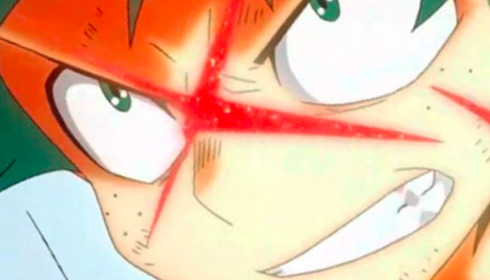
We end on a confident Deku smile and Daiki’s adorable ‘hai.’ Basically, i really enjoy this episode. A little slow at the beginning, maybe. But that conclusion is amazing and so worth the payoff. It’s even got this amazing rhyme and rhythm to it, cutting back and forth between the different students and teachers and just having themes echo between each other like poetry. It love it.
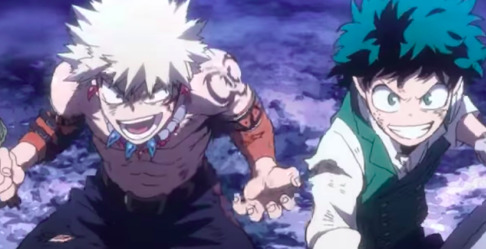
To close off: ED4, AKA BEST ED EVER!!!! This is seriously, no sarcasm, best ED. So for those of you who don’t know, the story behind ED4 Datte Atashi no Hero is, 1: The Fantasy AU theme comes from the second popularity poll, which came out around Chapter 120/Episode 61 (yes, THAT one) and for which Horikoshi drew the top 10 in fantasy garb. 2: The Song was written by LiSa and was explicitly stated by her to be effectively about Izuku’s feelings towards Kacchan. I wrote a post analyzing it. It is, basically, the anthem for...
BKDK CORNER

“Loose…” Guess who the first person Deku thinks of to create Full Cowling is? If you sad Kacchan, ding-ding-ding!
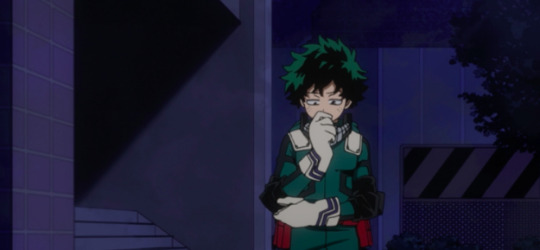

On an analytical note, I think it’s very, very significant that the first real breakthrough Deku makes in handling his power comes by observing Kacchan and imitating him. This is one of my Top 20 Favorite BKDK moments, even though it’s completely indirect, because of how important that is in the long-run. But what about the Imitation theme? Why is it OK for Izuku to imitate Katsuki, but not All Might? Well, first of all, he does use Gran Torino’s moves as well, but mainly, I think the series is saying with this distinction that it’s OK to imitate someone if you see their flaws and acknowledge them, but if you hero-worship them and see them as perfect, you’re only going to screw yourself over. This is why Iida imitating Ingenium, Shoto imitating his mom, Deku and Kacchan imitating All Might, and yes, Uraraka imitating Deku, are all so bad for them. If you see someone as perfect, and want to imitate them, you’ll never achieve that in your mind, because you already view yourself as imperfect. So Deku can imitate Katsuki because he thinks he’s a jerk, but also an amazing fighter, and Gran because he thinks he’s weird, but tough.
Also Deku just automatically thinking of Kacchan first is so damn shippy.
BEST GIRL OF THE EPISODE: Uwabami!
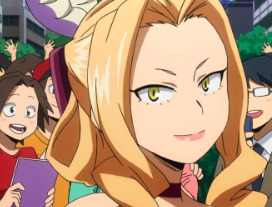
RANKER: Ranking the Internship Pros, least helpful to most.
10. Uwabami
9. Mt. Lady
8. 4th Kind
7. Endeavor
6. Death Arms
5. Manual
4. Selkie and Sirius (anime only)
3. Gunhead
2. Best Jeanist
1. Gran Torino! (Deku lucked out)
#my hero academia#episode 27#season 2 episode 14#bizarre gran torino appears#midoriya izuku#gran torino#katsuki bakugou#momo yaoyorozu#katsudeku#bakudeku#be prepared for lots of gushing#my deku bias is strong with this one#everyone has their fave#i'm glad mine's the mc#sometimes anyway#come s5 he's gonna be like#barely around for a whole damn season#anyway so glad to be at the Hero Killer arc#let's go!
16 notes
·
View notes
Text
NSFW #12: Oil and Water
On paper, Hardcore Revolution had been a success. NSFW had walked in as Tag Team champions and even after the challengers fought with everything they had, NSFW had walked out as Tag Team champions. Mike and Bishop shared stoic, defiant expressions as they backed up the entrance ramp - making a hasty exit from the public eye.
They retreated to the recesses of the Rupp Arena, witnessed wordlessly the chaos of the following match, dressed into their street clothes, and departed.
Ace Heart and an accompanying cameraman caught them for a website exclusive before their departure midshow. Church had just slung both of their bags into Alundra’s trunk as Mike sat in the driver’s seat with the powerful engine idling. The experienced interviewer tried his luck - hoping that months of radio silence between them had mended previously bad exchanges.
“NSFW.”
Church closed the trunk and looked up blankly at him - then strode over to the passenger’s side.
“A word about your successful title defense.”
He opened the door.
“What’s next?”
The big man dipped down under the frame of the door as he stepped into the car. He slammed the car door shut emphatically. Ace moved to the driver’s side and tapped on the glass.
“Lots of speculation on your change of behavior as of late. Any comment?”
The window came down. Not a lot. Just a little bit. Ace was met with an emerald death glare that he was probably incredibly familiar with by now.
“It’d be obvious to anybody who didn’t eat fucking paint chips as a child. If I ran you over right now, you’d probably be pretty goddamn leery around cars for a while after, wouldn’t you? … Nevermind, fucking metaphorical shit is probably lost on you. As for tonight? We told them. We told them not to goof off. We told them to take us seriously and they didn’t fucking do it. Excuse us for being a tad insulted.”
John interjected.
“Not to say that our opponents didn’t put on a valiant effort. I commend them. And maybe...”
He paused.
“This is an ugly business.”
His gaze was direct at this man. A fellow employee who he could never get on the same page with despite being amicable with most everyone else.
“And maybe beyond all of this...”
Another pause.
“Mike. Let’s just go.”
“Before you go. There are some that say that you two have changed for the worse since winning those titles. Anything to say to that?”
Mike’s return glare somehow grew icier, harsher. Her voice sounded not only annoyed, but exhausted.
“Heart. I don’t know if you’ve been watching the fucking news, but there’s more important things going on than continuing to lose fucking brain cells talking to you. Church’s right. We’re going home.”
The window was rolled back up, and Ace Heart gave a startled jump backwards as Alundra sped off without any further warning.
Their community had been grievously wounded that weekend. That with the rampant speculation about the two’s temperament had waned interest in the business and everything that encompassed it. They drove back home and that Tuesday morning - they stood with their neighbors in a vigil to mourn the losses of eleven innocent souls.
But after that, there was Japan. Sixteen hours - cross country and then across the Pacific ocean. International travel had not been uncommon for them but with what was slated for them in Tokyo the following Monday, there was a trepidation for just what they were walking into.
They would be visiting the island country for two weeks and there was plenty to do, and Mike had amassed quite a list of extracurriculars- cute and sugary and fun things, but also, and perhaps a little out of character for them, quiet and spiritual sorts of things as well. To that end, they decided when looking over places to stay to choose a beautiful ryokan, or hot spring inn, about an hour and a half outside of the city of Tokyo proper.
The ryokan was just as stunning as advertised- their room was a very appealing blend of modern and traditional Japanese decorating, and there was a private balcony with a table, two chairs, and their own private onsen- a traditional open air hot spring bath that steamed invitingly in the cool evening air. Beyond the balcony was a view of Mt. Fuji that they both found absolutely breathtaking.
Their trusty camera clicked on to the sight of two of them standing out on that balcony, leaning with their backs against the wooden railing, the awe-inspiring mountain clearly visible behind them. They appeared well rested, having slept off any jet lag, and perhaps a bit more at ease than in past weeks. Their title belts rested comfortably in their rightful places over their shoulders.
“Context.”
John stepped aside - allowing the camera to take in more of the long dormant volcano.
“In World War II, this mountain was used as a symbol to evoke nationalism for the Japanese war effort. Meanwhile, the United States used the very same mountain to demoralize those very same soldiers via propaganda. The mountain never changed. It has always stood just behind us. A symbol of this country’s spiritualism. Mike and I. We are that mountain. People will use and twist who we are into whatever they wish. Always ignoring the context. Never asking why. Forgetting that we've never changed.”
“Some of the old folklore around here even paints the mountain as a god. Are we gods? Nah. Not far’s I know anyway. We ain’t gods or devils or any other extreme fuckin’ stereotype. What we are is something way more… nuanced?”
She glanced up at her partner, who gave her a smile and a nod. Mike held back the urge to give herself a congratulatory small fistpump.
“Nuanced. Or in another word, human. I said what feels like a billion fuckin’ years ago, we don’t fit into anybody’s boxes. So if people think we should be acting one way, and we act another, is the problem ours? Or theirs?”
John shrugged.
“Doesn’t matter to us. Let’s pick up an old thread. We successfully defended our tag team championships against two people that we do consider to be our friends. However. We’ve considered a lot of people to be our friends lately. Including one of our upcoming opponents. Mike and I spoke a lot about it. I think there are some misunderstandings. And maybe we read into things that just weren’t there. But we saw what we saw. And even with that, we fought with honor. And so did they. One day, those two will come back and be ready for another try and maybe they’ll think back to all of this as a learning experience.”
“I hope so. They could really be something awesome if they just took some shit seriously. But that was Monday. And now we get to fight a great foe and a rotten fucking friend. Now, we’re not gonna spend a lot of time crying over the obvious. Everybody who wasn’t hiding under a goddamn rock knows what Sanders did. Shouldn't take a Psych major to guess how we feel about it. As for Garcia, this isn’t the first time we’ve gone around the rosey with him.”
Mike leaned forward, one brow raising in what could almost be some minute degree of concern.
“Hey Cherrypie, you sure you wanna trust this guy? I’d advise against it if I were you, because shit, even you are a better fucking caliber of person than he is. I mean he’s flopping in the raw sewage with the likes of the blonde walking fungus, you sure you want that splattered all over your nice fucking suit? You’ll never get the stench out.”
“Why bother?”
He looked at Mike and shook his head.
“Why bother to rationalize with someone who has closed their eyes to the world? Incapable of grasping any sense of reality. These are the sort of people that Dominic Sanders surrounds himself with. Because except for that shining accomplishment in New York, Dominic’s time here has been wrought with …”
John steadied his hand in front of him and tipped it back and forth as if it balanced on a fulcrum.
“Inconsistencies. For every accomplishment, there were two pitfalls. For every defining victory over long time rivals or championship boons, there were stunning defeats. Falling to Griffin Hawkins shouldn’t have been the catalyst to orchestrate some charade to manipulate his way into his greatest opportunity. And instead of embracing that chance as a way to finally shine, he shows his true face. Callous. Apathetic towards the people who have supported him through his farce. Surrounding himself with like individuals. However - Dominic should ask himself what it means when he and five other people can’t defeat one, albeit very strong, man.”
Mike tisked a bit.
“Six guys against one biker. Now, I’ve seen some weird shit circling around Happy lately, and I have to come to the conclusion that either Happy is a magical biker- which would be DC Comics level of badass- or your little makeshift militia really fucking sucks. Or maybe it’s a little from column A and a lot from column B. I mean granted one of those guys was Jeff Noon, but still. Come on. If you were trying to make a meaningful impact it went over like a wet fart.”
John raised an eyebrow at that statement but continued nonetheless.
“But if you really think about it - it makes complete sense. Dominic Sanders surrounds himself with people that share his ideology. The Limit. A tag team that professes that they do not care about winning. Skirting around the fact that their only victories come from cheapshots against opponents who win less than they do. A team that since trying to use NSFW as a statement - has been violently mediocre until they decided to go to the well once more. Didn’t work the first time - so why try again?”
Rhetorical.
“Draco Lazarus - a wrestling prodigy so consumed with himself that his proclamations of greatness would be funny if he wasn’t dead serious. Used to be a leader of his own gang of misfits until even they had enough and moved on. Now he’s a follower. And despite these new alliances, he failed to live up to his namesake once again.”
He looked to Mike.
“And what about Rob Garcia?”
“What to say about sweet Cherrypie that we haven’t already said? I know. He somehow stumbled into the tag team championships while being the worst tag partner in the whole wide world. I mean, he was kind of the low man in the entire ReVenant outfit, and once they all skipped town without him he wasn’t able to keep a consistent tag partner after everyone realized what a spoiled, stupid goober he was.”
“To be fair, Morgan Darkwater wasn’t the paragon of virtue that we all thought he was.”
“Disappointing. But what do you expect from a fucking… pirate? Mercenary? Eh, I think you call that a privateer. Either way, it don’t matter, cuz he’s fucking gone-zo. Sailed off into the sunset, left Garcia all alone yet again, without any titles, real or imagined, to keep his poor sad self company.”
“Dominic has assembled this motley crew with designs of molding this company into his image. And in their first cumulative outing - they fail. Typical. And now he, mere weeks away from what he hopes to be the greatest night of his career, looks to use us as an example of his mettle. With Rob Garcia as his charge. What could go wrong?”
“Dumbinic Sanders…”
John stifled a chuckle.
“Dominic, you mean.”
“Not if this is his fuckin’ plan I don’t. This is like one of those movies that opens in a shocking manner and gets you all on edge and then just drizzles a promising plot down its own leg like baby diarrhea. Still… even though he’s proven really fucking incompetent as a squad leader and is coming at us with a dude who not only has never pinned us but has all the mental sharpness of cream cheese left out on the counter overnight, we’re not going to make the mistake of underestimating you two. After all, one of you is a Rumble winner and the other is actually really decent if and when he gets a fire under his rich-boy ass.”
John affirmed that with a slight nod.
“But you two are facing the standard bearer of this company’s tag team division. And that doesn’t mean we are infallible. It means that we faced adversity head on and learned from our shortcomings. After NSFW was defeated by two world class competitors representing the Trinity, what did we do? We came back and captured a victory against the tag team champions at the time. Putting the world on notice. And by the way, where is the Trinity now to forsake our claim?”
Mike gave a very exaggerated sorrowful look, wiping away an imaginary tear.
“Looks like poor Xavier’s become a doorstop baby.”
“And when Mucho Grande went through us to claim a shot at these titles, what did we do? We fought through every team we could until we rectified that wrong. And where is Mucho Grande to dispute our credibility?”
The redhead stood up ramrod straight, crossing her arms across her chest like a coffin-bound corpse.
“Mucho Muerte.”
“That’s right. Despite all of that grandstanding, when push came to shove, they didn’t have the fortitude to backup all of that machismo. NSFW is the constant and Dominic Sanders and Rob Garcia are oil and water. Their only commonality is that they neither of them can get it done as a tag team. Rob Garcia’s last venture went belly up after never winning a match. Dominic Sanders idea of partnership is throwing a fit and attacking Kendrick Kross. After losing to Rob Garcia ironically.”
“...what a weiner. What did we ever see in that guy?”
John stared at Mike blankly. The cog wheels were turning to find one, single, solitary reason.
“Gil.”
Mike grinned fondly in spite of herself.
“Yeah, yeah you’re probably right.”
“But it was always there. Just under the surface. That charming smile a mask concealing his sinister motives. My first exposure to Dominic Sanders was him slamming a steel chair into my back repeatedly. Much like our meeting with Rob Garcia. So understand that Mike and I have not forgotten that.”
“Everything you’ve done is gonna boomerang right back in your stupid smug face. You’ve hurt a lot of people in a lot of different ways, Dom. The bill’s coming due and it’s payable in blood, bruises, and busted teeth. Now, we aren’t stupid. We know this won’t be a fair fight- the moment things start getting hairy, you’re gonna call in the gilded turd and your rabid animals. And maybe Jeff Noon for some reason. Maybe we’ll have backup if that happens. Maybe…”
Mike let a puff of a sigh out.
“...maybe we won’t, and if we don’t, I guess that’s alright.”
“We’ll deal with what comes. Together. They’ll bring ugliness and hatred. They’ll try to tear us down and Mike? They’ll fail. Afterwards, Rob Garcia can go back to his clueless world of luxury. Dominic Sanders after the realization that he isn’t as good as he thinks he is can go lapse back into his grizzly misogyny - demeaning a woman who has achieved more than he could ever hope to do. Tired tropes. Little girl. Whore.”
His eyes narrowed. And for the only time in this video, he addressed Sanders directly.
“I only see one of those. You. A man who has debased himself in utter desperation. Relevance fleeting, you turned to cruelty and malice to get what you want. And on that night. That very special night, you’ll fall short. Re-evaluate your expectations. Monday will be a preview of that very outcome.”
“You’re not gonna win, cuz we ain’t like the others. We ain’t going away. No Skipping, Faltering, or Washing out. I hope you realize the fucking hornet’s nest you just kicked. Till Monday. Sayonara, chumps.”
They both gave a brief wave. Stepping forward, Mike turned the camera off.
1 note
·
View note
Text
It’s the waves
I tried writing about him to make sense of my feelings. But, in every story I wrote about him, he was the villain. Imagine a monster who is able to shape-shift into whatever you wanted to see – into a projection of your desires, your ideal human.
He said he was able to adapt his personality to become what people wanted to see in him. That I wouldn’t be able to recognize him around other people. He was worried that was a bad thing. That he was fake, or somehow a bad person.
I told him – when I looked into his eyes – all I could see was good. Though, I’m not sure if I could see anything. His eyes were dark and murky, and I could faintly see my reflection in them.
He made me a playlist. I listened to nothing else but that playlist the entire week. I wondered if I listened to it enough I would know what the inside of his brain felt like. I didn’t understand him, but I wanted to figure him out. I’m deeply attracted to mystery. He said when I did finally figure him out I would get bored.
Even though he’s had a tragic life, he never cries. He’s told few people about his past, and he said I was the only one he’s told since he got here. There’s nothing like a secret to draw you in. I’ve heard that psychopaths tell you secrets to try to gain your trust.
He was about to kiss me and I told him he couldn’t. I told him I needed to have a conversation with someone first. So, we stayed frozen in that anticipatory about-to-kiss moment – him looking at me looking at him looking at me. He told me he thought I was being a good person, though I’m not sure if I was. We talked about morality, the kiss as a symbolic gesture, and how the Jewish religion says that only actions – not thoughts – can be sinful.
He said none of this situation was my fault. But, I said maybe it was. Maybe I’m drawn to conflict because it gives me something to write about. It’s the waves that create the stories, not the still waters. It’s the tides that move back and forth, not the shores. Which is maybe why I chase the waves. Why I throw rocks, just to make a ripple.
I had the conversation the next day – with person B. It hurt to be embodying the position of people who had hurt me in the past. I thought it would hurt more to be losing the closest connection I had since I got here, but loneliness can be a delicious emotion. He cried, and I felt bad for not crying too. I slid an apology note and a chocolate bar under his door the next day.
Then I told him he could finally kiss me. For all the build-up to the moment, I didn’t expect his kiss to be so – dry. I didn’t expect him to look so different up-close, or to smell the way he did.
You know when you go through a period when you are incredibly moved by music, but then music suddenly stops mattering to you, so you start listening to podcasts and audiobooks instead?
I told him about this study I read that said people who interpret sentences like “the rock lives a long time” as literally true (this is called an “ontological confusion”) are more likely to be spiritual and engage in magical thinking. But, that’s not a confusion, he said, that’s just another definition of truth. You get it, I said, am I ontologically confused because I think metaphors are real and the world feels alive?
He asked me what attraction feels like to me. Inadequacy, I said. Comparison. A state of hyper-awareness, of hyper-embodiedness. People say that beauty often leads to the desire to replicate, which is why we take photos of the things we find beautiful. I think beauty leads to the desire to become, or the realization of what you won’t ever be able to become. And because inadequacy and attraction so often co-exist, I said, sometimes we confuse feelings of inadequacy for something like desire.
Is attraction without inadequacy love? he asked. That is a sad definition of love, I said. And to clarify, you do not make me feel inadequate. So, you’re in love with me? he asked.
When I went over to his place, I realized I had lost something – a small, silver lucky turtle charm that I carried in my left pocket everywhere I went since I was thirteen. I felt like I had lost the part of me that stays constant when everything else changes. Maybe I was just ontologically confused to think it mattered so much, but the sheer weight of my thoughts about it made it matter, whether or not it actually did. Though maybe I needed to lose something to move forward, maybe I needed to stop repeating old, worn-in thought patterns or trying to become what I was before so that I could become whatever I was becoming. I wasn’t sure if I liked what I was becoming, but I also wasn’t sure if I would be able to stop becoming it. Reality always continues to move forward as it does.
Maybe he wasn’t the villain. Maybe he was someone – less interesting. But, maybe I needed a villain, and maybe he was becoming what I wanted to see.
#cat person#story#poetry#writing#creative#words#love#spilled ink#spilled thoughts#spilled words#dreams#beauty#attraction#art
2 notes
·
View notes
Text
Gunnerkrigg Court: Chapter 3 part 1 (title page)
So considering how fascinating the title page is I decided to dedicate the first post to it.
I’m sure those of you who know how I work are not surprised.
Stuff like this is like cocaine to me. :D

Before we continue I wish to address something I discovered while reading chapter 2. It’s an alchemy symbol. I recognize most symbols since I find them fascinating. But it was so late at night I didn’t look into it until yesterday.
And then I saw the title page for chapter 3

MORE SYMBOLS I AM SO HAPPY! XD

So the symbol turned out to be for the element Antimony. Which also happens to be the element our MC is named after. Very interesting. Let’s investigate further.
And thanks to this neat little site. I have been made aware it also symbolizes wild spirit. Wolves in particular. Very interesting and I’ll say why.
Wolf lecture time :D
Many peoples throughout the world respected and thought very positively of wolves. Among the various peoples and tribes of North America, wolf represents not only creation, but also death and rebirth. Wolf is also seen as a teacher-animal to the peoples of California and the Great Plains. They saw the wolf retreat into the mountains and hills to get away from humans, and made the connection between wolves and high places (in other words, spirit). In the Lakota language, the word for wolf, sunkmanitu, means “divine dog.”
In western Europe, wolves were not seen as positively. In both German and Norse mythology, wolf was a symbol of destruction and death. Vikings saw wolf as a representation of Fenris (their Chaos), who would bite through his chains and consume the sun at the end of time. In an unusual story exhibiting the wolf’s loyalty, in Great Britain, Merlin in his time of madness is kept company by a she-wolf, who stays by his side until he becomes well again. Romulus and Remus, the famous twins in pre-Roman times, were said to have been raised by a she-wolf--even suckled by her.
Wolves are respected nearly everywhere except Europe, where they are instead feared. They are seen as teachers, instructing us in our daily lives and all the troubles that go with them. The lessons wolf teaches are not always easy to swallow, but nevertheless necessary. Wolf is a symbol of guardianship, ritual, loyalty, and spirit. Wolf has the ability to make quick and firm emotional attachments, and often need to trust their own instincts. Thus they teach us to do the same, to trust our hearts and minds, and have control over our own lives.
Antimony is a regarded as a cooperative metal because it works best when it is combined with another metal, notably lead, brass and bronze. It is actually a metalloid that does not react chemically as a metal but has metal-like appearance & physical properties. It is a protective metal and teaches the values of transformation and adaptability. It teaches of wisdom and strength that can be gained from others and also given in return. Antimony represents the free spirit, wild nature or animal power dwelling within all humans. A person can benefit by wearing this symbol when feeling meek.

Governed by the planet Saturn, Lead has dark connections and is related to death and transformation. This toxic metal represents impurities, of the metals as well as the humans and its burning is metaphoric with cleansing and removal of imperfections. It was associated with divination spells. The lead was one of the earliest metals known to man and was widely used by the ancient Romans, Egyptians, Greek, and Chinese.
Now I couldn’t find an animal like with the others but if I looked up the planet it’s connected to then I get this. Saturn historically governs snakes, mice, foxes, dragons, and nocturnal birds of prey such as the owl. It is interesting to note that the owl is commonly misunderstood as a symbol of death.
ANTIMONY is also used for hardening LEAD.

Associated with the planet of the same name, Mercury is an unusual metal that exists in the liquid form at room temperature. It is a toxic metal and is associated with death, mystery, and transformation. It is connected with divination and scrying. Mercury is also related to travel and movement, be it of physical or spiritual nature. The metal was known to the ancient Romans, Greeks, Hindus, and Chinese. The alchemists considered it one of the three principal substances on Earth, along with salt and sulfur. The metal is often also represented by a serpent or snake.
The Roman god he was often accompanied by a cockerel, herald of the new day, a ram or goat, symbolizing fertility, and a tortoise
Similiarities between all three: Common heavy metals, toxic trace elements. (Side note all three along with another element cadmium can be found in never-pregnant women of fertile age.)

Next we have the title. And here is where it gets extra interesting.

Now what’s interesting is that Lead is connected to foxes... and this tale is about a man who is a werefox.
Makes me wonder if we are going to run into a character who will have ties to the element. And if we are going by the legend they will try to attract others. Even though they are a dangerous person with possible ill intentions that could lead to death.
Anyways let’s move on to the ballad itself to see how it relates to the story now.
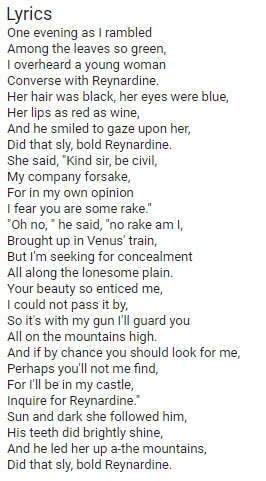
In a historical context, a rake (short for rakehell, analogous to "hellraiser") was a man who was habituated to immoral conduct, particularly womanising. Often, a rake was also prodigal, wasting his (usually inherited) fortune on gambling, wine, women and song, and incurring lavish debts in the process.
And the werefox claims to want concealment... the action of hiding something or preventing it from being known.
This Reynardine is quite the chrismatic... and seems to merge well with Lead symbolism. Hmmmmm... Interesting.
Anyways Antimony may end up running into someone of a “foxy” nature. Badoom psh.
Also she may have connections with wolves... just saying.
I love Alchemy and wonder how much we will see intertwined with the story. :D
#gunnerkrigg court liveblog#gunnerkrigg court chapter 3#gc003#gg liveblogs gunnerkrigg court#gg liveblogs gunnerkrigg court chapter 3#gg liveblogs
5 notes
·
View notes
Link
As Always: text is provided only in the event of access expiration or post deletions from the hosting site. Whenever possible, always read the article at the link.
Blood Types
‘The Vampire: A New History’
By Regina Munch
October 29, 2018
Books Secularism and Modernity
The Vampire of Vinesac, 1883 (Chronicle / Alamy Stock Photo)
Right from the start, a recent long-anticipated trip to Romania delivered on its promise. On the shuttle from the airport into the heart of Bucharest the driver asked if we had ever visited before. When I told him no, his mood turned grave. “We have a beautiful country,” he said. “But it is not safe to go out at night, especially for a young woman.” When I asked why, he hit the brakes, turned around slowly, and smiled. “You must be careful of the vampires.”
It was just what I’d been hoping for. A huge fan of Dracula, I’d always wanted to see the place that had inspired Bram Stoker’s classic tale, and to get a sense of how its citizens feel about clueless foreigners associating their entire country with nocturnal bloodsuckers and Vlad the Impaler. They certainly seem willing to cash in on it, judging from the tourism industry’s marketing and advertising. But they also revel in it, as evidenced by my grinning shuttle driver.
Romanians are hardly the first people to use the myth of the vampire to establish an identity or advance an agenda, as Nick Groom makes clear in his book The Vampire: A New History. Far from a Freudian representation of sexual desire, an inelegant metaphor for colonialism, or merely a played-out trope, the vampire, according to Groom, is something more layered and complex. “Vampires came into being when Enlightenment rationality encountered East European folklore,” he writes, “an encounter that attempted to make sense of them through empirical reasoning and that, by treating them as credible, gave them reality.” Various folklore traditions make whispering mention of mysterious hybrid ghosts, zombies, werewolves, and demons, many of which suck blood. Only after members of the European elite began to investigate these entities using the science of the day did they become what we know as vampires. Thus, “the vampire is a specific phenomenon that dates from a precise period in a certain place, and which consequently has recognizable manifestations and qualities—particularly concerning blood, science, society, and culture.”
Groom divides his book into two sections—delightfully titled “Circulating” and “Coagulating”—to demonstrate the flow of ideas about disease, demonology, and politics in the seventeenth and eighteenth centuries, which congeal in the nineteenth and twentieth centuries into the Gothic literary figure—epitomized by Stoker’s Dracula—that we’re familiar with today. He writes that although most histories of vampire mythology begin in the Victorian era, the Gothic monster can be traced back to the folkloric milieu of the previous two centuries. From Eastern Europe came tales of bloodsucking creatures that stalked the living, tales that through the 1600s and 1700s spread across the continent. They shared many of the same elements: the vampire comes into being through the reanimation of a corpse; it can influence the weather and certain animals; it preys on loved ones, strangling and sucking the victim’s blood, often from the chest; it can be killed with a stake or by decapitation. Localized versions might include more specific details, such as the unearthing and opening of a suspected vampire’s coffin to find the corpse floating in fresh blood and gore. Sometimes it had partially eaten itself and its clothes. In other versions, one could protect oneself by drinking blood from a vampire’s head, eating the dirt from its grave, receiving Holy Communion, or making the sign of the cross.
The corporeality of the vampire—as opposed to the ephemerality of a ghost, for example—lent itself well to “investigation” via the latest medical and forensic methodologies. William Harvey’s discovery of circulation, Christopher Wren’s development of hypodermic injections, and fears of contagious disease were changing the way the body was understood, and when European empires consolidated power over Eastern Europe, they deployed new techniques to make sense of what they were hearing about. It was only in such investigations, Groom writes, that vampires were “discovered”; they “did not exist until the emerging medical profession and natural philosophers began to try to explain them and they were thus named and categorized as vampires.” When, for example, a recently deceased woman was reported to be attacking villages in Moravia and her corpse was found to have fresh blood in it, Holy Roman Empress Maria Theresa deployed two doctors and the head surgeon of the military to look into the matter. Such investigations were thoroughly documented, as Groom writes: “Detailed forensic examinations were accordingly made and records kept, including catalogues of signs and symptoms, and much learned (and pseudo-learned) work was published in professional journals.” Indeed, in the 1730s, many such journals made their reputations for scholarly seriousness and rationality with accounts of outbreaks of vampirism in Eastern Europe.
Even Enlightenment philosophes weighed in, trying to discern what was mere religious superstition and how, if vampires did indeed exist, they might be incorporated into knowledge about the natural world.
As these reports spread west, debates about vampires “detonated.” One of Groom’s most interesting chapters recounts the different ways religious authorities responded to reports of vampires, and how their responses reflected their own theological and political priorities. The Catholic Church, for example, downplayed such reports; clergy saw that they might lose their influence if people resorted to near-pagan methods of protecting themselves from spiritual peril. Eastern Orthodox clergy, on the other hand, promoted belief in vampires and presided over stakings and decapitations of suspect corpses to reinforce their power over encroaching Roman Catholicism. From a theological standpoint, the issue was even thornier. For Protestant theologians, “vampirism, seemingly engineered by the Devil and his demonic minions, smacked too much of Catholic superstition” and so was dismissed. Catholics, theologically invested in corporeality, were in more of a bind. If the dead really were being raised to hunt the living, did that mean the Devil was as powerful as God? This couldn’t be true—so was vampirism a diabolical illusion meant to lure sinners into pagan beliefs? Even Enlightenment philosophes weighed in, trying to discern what was mere religious superstition and how, if vampires did indeed exist, they might be incorporated into knowledge about the natural world.
Bloodsucking monsters also transformed political life. Groom writes that as scientific discoveries increasingly “medicalized” the human body, so the metaphor of the “body politic” changed as well. Vampire analogies proved useful for political agitators: usurers were called vampiric for their predatory loans; monks sucked funds from the wallets of peasants; corrupt officials cannibalized their citizens. In other words, “blood oozed through eighteenth-century thought…simultaneously part of everyday life, a mysterious substance of folklore and superstition, [that] lay at the heart of the Christian mass and the symbolism of the Church.” The figure of the vampire encompassed all these aspects.
It is from this frothing and fearful era in European history that the literary Gothic vampire was born in the nineteenth century. While vampires originated in Eastern Europe, Groom writes, their main “artery” was England, where the vampire became Gothicized and Romanticized into the figures we know today. Anxieties over medical advances—corpse-harvesting; vivisection; and a new institution, hospitals—seeped into vampire stories. As theories of evolution began to gain traction, vampire mythology became a vehicle for expressing fear of regression to a primeval state—one in which we are all bloodthirsty predators. Soon enough it was fear of women—specifically the “New Women,” who “dressed casually, smoked, rode bicycles and even—horror of horrors!—educated themselves.” (It is telling that most nineteenth-century vampires were female.) Karl Marx applied the vampire metaphor to economics and politics: “Capital is dead labour which, vampire-like, lives only by sucking living labour, and lives the more, the more labour it sucks.” Stoker’s Dracula is a culmination of all these aspects of the nineteenth-century vampire. The text is a “mass of papers—a scrapbook of textual proofs that reflect the earlier emphasis on evidence and authenticity.” Dracula is brilliant for its ability to set old folklore against new technology, to combine “contagion and the body, blood and the economy, political power, the invisible and vampirism” that haunted the Victorian imagination while drawing on an earlier obsession with empirical evidence and investigation.
Lurking in the cracks of social, theological, political, and medical knowledge, vampires drew “uncomfortable and disturbing attention” to society’s shortcomings. Always threatening to escape the cracks, to “ooze” and “contaminate,” vampires confound boundaries and borders, natural and supernatural, self and other. Groom writes, in the most chilling passage I have read in an academic text, “Vampires are not both dead and alive; they are also undead. And so they disturb the primacy of animated life and humanity by replacing the fundamental distinction of life and death with a third state of being”—that is, unbeing.
Though Groom impressively manages to analyze vampires’ influence on almost every facet of private and public life—social, theological political, medical, cultural, sexual, literary—over the span of four centuries, there are a few missteps. For such a well-organized book, the writing can meander. And in his evident enthusiasm for the topic, Groom sometimes loses the reader with examples that don’t quite find their way back to a larger point. But the examples are so fascinating in themselves that this is forgivable.
Groom writes that he has “tried to resist essentializing the vampire as an elemental mythic type,” or letting it be a mere canvas for theories about sexual neuroses, colonialism, or feminist theory, “valuable as these approaches might be in other ways.” Instead, “the vampire becomes more thought-provoking and more perplexing” in its correct historical context, and when it is allowed to seep from the fractures in our thinking and the contradictions of daily life. “Vampires are good to think with,” he writes. Let them be the “roving thought-experiments” that they are. I agree with him there. Just be careful at night.
1 note
·
View note
Text
Sylvia’s Cooking
I just got my first Stonewall 50 email. At the bottom of the email in the small print it says Heritage of Pride™, which means it’s still run by the same guys as always, except under more scrutiny now, after getting the march on Channel 7 and with the whole world coming next year to physically or spiritually fit into that little pie-wedge space on Christopher Street where the Stonewall Inn bar is located. This World Pride thing isn’t just an advertising slogan they came up with at HoP, it’s a Thing, like Stonewall 50’s a Thing. My therapist, who’s very active in the community and probably gets lots of interesting emails from various Things, told me it happens at a different city’s Pride each year.
And next year, of course, they’re coming to New York, because it’ll be the 50th Anniversary of the night Sylvia Rivera and her friend Marsha P. Johnson (who I never met, and who may have thrown the first punch, there are scholarly debates on this point, but I am told that Sylvia firmly insisted that she was the first one who punched a cop, it’s like the debate over Lexington and Concord, they’re not sure exactly where the Revolution started but we know that they started it) threw out the first punches to start the legendary three-day riot, rather than just get in the police van like always, right in front of the Stonewall Inn. The night the drag queens finally began to fight back. It made a sound heard ‘round the world, and it’s still reverberating, and if anything really changed the course of history in that wretched year of 1969, that surely did.
It reached me in the front seat of our car when I was with my mom one Saturday, when for once my sister wasn’t with us. I used to like tagging along on her Saturday visits to her office, wherever that was. As we were about to drive away from the small airfield where she worked as a secretary to go to some thing where co-workers were already playing bad country music, I asked her what a homosexual was. It was a sunny day and there was no one else around for a mile in any direction. It was the Summer of 1969, of course, and I was eleven years old.
I can only suppose this is just after I’d heard of Stonewall in the news. It was the first time I’d ever brought up sex as a topic of discussion with my mother, and I did this with some trepidation. I sort of knew this wasn’t her favorite topic of conversation generally, sex, much less transgressive sex. The kind hippies had. Maybe some of them were homosexual, who knew? So I persisted in my line of inquiry. What I didn’t know was that she’d been waiting for some version of that question ever since she’d stopped dressing me in dresses, when I was two.
She put the transmission back in park, turned the engine off, sighed, and for once didn’t light a cigarette before we started what turned out to be a lengthy, meandering conversation, which wandered after a while into related and then tangential topics, and which ended with me correcting her on some minor misunderstandings as to how gonorrhea was transmitted, at which point things kind of ground to a halt and she started the car up.
The whole thing probably took an hour. She used to joke that she’d had the Talk with me, the generalized birds and bees talk, because we did touch on conventional sex and How Babies Are Made, but that I had ended up explaining some things to her, instead, which shouldn’t have surprised her. I did read a lot, after all. I probably already knew a couple of things about homosexuals, but I wanted an explanation of how they actually Did It, and as squirmy as that made me, I wheedled it out of her. I could’ve asked her more about how a male-female couple had sex, but that wasn’t what was on my mind. She wasn’t happy about it, and did her best to make it clear that it was all gross and disgusting. I think she made a face when she was explaining lesbians to me. I liked the sound of the word the first time I heard it, tbh: Lesbian. It sounded soft and fuzzy.
I remember wondering about the feasibility of anal sex, as she sketchily and hastily outlined it, which apparently was what men did together; but what women did together sounded really kind of fun and not nearly as difficult. She didn’t want to talk about that, though, and I do remember that it was around there that the discussion went off into the weeds, to things related and not. Eventually we ended up at syphilis and gonorrhea (aka “VD,” or venereal disease, where venereal=“vaginally transmitted,” rather than “of or having to do with the goddess or planet Venus” — clearly a term invented by men) and I explained some of the then-current science on transmission to her, i.e., you don’t catch it from dirty toilet seats in public restrooms. Not girls, not boys, it’s a myth, mom. They told us in science.
All that was fifty years ago, as of next June. The following June, in 1970, they had the first Christopher Street Liberation Day March, so 2020 is the fiftieth anniversary of the March. But next year is the Big One. It looks like this anniversary will be just as controlled and careful as the 25th anniversary in 1994 was huge and utterly chaotic and wonderfully random, with 200,000 marchers from around the world. We took over Central Park. We took over freakin’ Midtown. It rocked.
Well, not next time. No more of that anarcho-festive celebration stuff. Now you have to be part of a signed-up contingent to be part of the march, and those slots are limited. And no more hopping in-and-out from the sidewalk, apparently. They want everyone in a marching contingent to wear the same t-shirts, ffs. It has to be controlled, as well as going backwards (starting a few blocks north of Christopher, past the Stonewall the wrong way, and up Fifth Avenue, what the fuck?) I’m told some of the people in the Village are tired of the crowds and the noise. They can do what people do in Austin when SXSW comes along: leave town. Tiniest quantum violin playing.
Now that it’s a TV show, I guess it has to run on time and look good on camera. They’ll have a beautifully made-up drag queen doing commentary like last year, along with the usual probably-white cis-guy-&-cis-gal parade anchors. I don’t know where they find those. It’ll become another tradition soon, that trio as parade anchors, now that scientists have established that str8 people in statistically significant numbers will watch drag queens on television and thus advertising time can be sold for this event. It’ll be just like the Macy’s Thanksgiving Day Parade, or the Fourth of July, only with One of Us in the booth along with two of them.
“And you know, Mike, the rainbow flag has been a unifying symbol in the LGBT community since it was first designed in 1978, and did you know that originally it had eight stripes….” There will be carefully-timed performances in front of the Stonewall, and commercial breaks. Some of the stories people tell will break your heart, some will make it sing. Plus commercials, did I mention the commercials? You can record it and FF through them. I did. I stopped this year to watch Chelsea and Rusty talking about Sylvia, which is what makes me think of them all, along with the fact that Sylvia and Marsha deserve statues, and you get reminded of that every June. I’d love to have a statue of the two of them at the Stonewall National Monument, which technically is the little triangular pie-slice shaped park, the benches and the wrought-iron fencing, where you can sit next to the statues representing gay men and women from the 1980s. They should add Sylvia and Marsha.
The whole parade on TV represents some kind of weird queer communications breakthrough, I guess. And now that it’s on every year, I suppose it has to be faaaaaaabulouss! I guess we can record it and go, too. And watch. There were some forums recently at the Center, maybe just one, where people could come and complain about the corporatization of Pride, and the most-of-us not marching thing, and the reverse-route thing where it just kind of ends around 28th Street for no apparent reason, and ask for things they won’t get, but that part’s over and it’s time for Early Bird sign-up.
Whatever. Sylvia and Marsha are the mothers of us all, both trannies and everyone else that fits under this patched, unwieldy tent called “LGBTQ.” We argue, some of us incessantly, about which part of the tent is what, and whether this part is even really part of the same tent as that other part of the tent, but no one argues with the fact that Sylvia and Marsha put up the first tent poles. That may not be the most elegant metaphor, but I’m going with it. Never apologize for your art.
And it’s kind of okay, I think now, or at least I’m trying to convince myself it is, that I never realized “who” Sylvia was, even though at least two people said I should talk to her because I was “interested in politics.” Hm? Oh, ok. No one ever said why. Ffs.
But it felt sort of like I knew Sylvia, the way it feels like I know these professors and other people who my wife works with, after I hear her describe them a few times. She’s a union delegate as well as a math professor, so she knows a lot of people. By now I also know a lot about professors in general. And in the same way I realized after a while from talking to people around T-House, conversations in which she came up, often at vital junctures, that Sylvia was the Mom around the place: she made dinner, I knew that much, and she did a lot of other things to keep Transy* House, Chelsea and Rusty’s house, from burning down, falling over, and sinking during those raucous years around the end of the 20th century. She seemed quite nice when I was introduced across a crowded room downstairs, which actually happened twice I think. She smiled and said hi, I do remember that. She seemed nice.
That, in and of itself, was quite difficult for some people I was around back then — this was and still is New York, the Attitude Capital of the Western Hemisphere and, during Fashion Weeks, the Tribeca Film Festival, and the General Assembly, perhaps the world — but from my brief impression she seemed genuine, and older in a reassuring way when I was twenty years younger. She gave off these hippie-mama vibes, just by making dinner. In a house where a whole lot of chaos happened, and necessarily so given how many trans kids with no other home came through there — because Chelsea and Rusty never turned anyone away, not as far as I know — not to mention how much fun was had there on a regular basis, at least some of it destructive of property, she just looked to me, in a vortex of drama, like a pole of stability.
Maybe that’s shaped by how people talked about her. Everyone said how nice she was; but I wasn’t over there often enough to run into her when she was (a) there and (b) had a free moment, and didn’t know I should prioritize it anyway. And there were other people using up the oxygen in the room at any given time, including me. But it would have been awesome to truly know her.
I knew other people there, had my own reasons for being there. I lived with Kathleen and our two-year-old son in an apartment which was also on 16th Street, in Brooklyn, two blocks away. It was the Nineties, so it didn’t seem unusual to me that there was a house full of transfolx a short walk away, nor that my friend Jamie knew everyone there. Like, she knew everyone. She was the other pole of stability then, around the turn of the century. She doubtless knew Sylvia pretty well, and she probably told me enough to form an impression.
Now Chelsea and Rusty own a bookstore upstate, and T-House is long gone, replaced by the ineluctable tidal forces of gentrification, although there’s a queer history tour that stops at the site and tells a short version of The Story. I wish sometimes they could have a sort of T-House reunion, somewhere, somehow. I would very much like to find Jamie again, even if only online. And I do still wish I’d gotten to talk with Sylvia.
#HistoricalNearMisses
__________
Footnote: Everyone back then except Chelsea, more or less, called it that, but without the “s,” if you get what I mean. We don’t say it anymore, at least not when younger transfolx are around. People get really upset, and if it’s only been used to hurt you it’s a painful word, I get that. Yet it was our word then, and it didn’t hurt at all. It was a warm, friendly word. It was what we called each other, lovingly, and no one else had any reason to use it, and I miss it.
this article also appears at https://medium.com/@kivazo/sylvias-cooking-1b1b4f24e780
#trans#gender#transgender#transsexual#trans lesbian#LGBTQ#LGBT#Transy House#Sylvia Rivera#Gay Pride#Stonewall 50#World Pride
4 notes
·
View notes